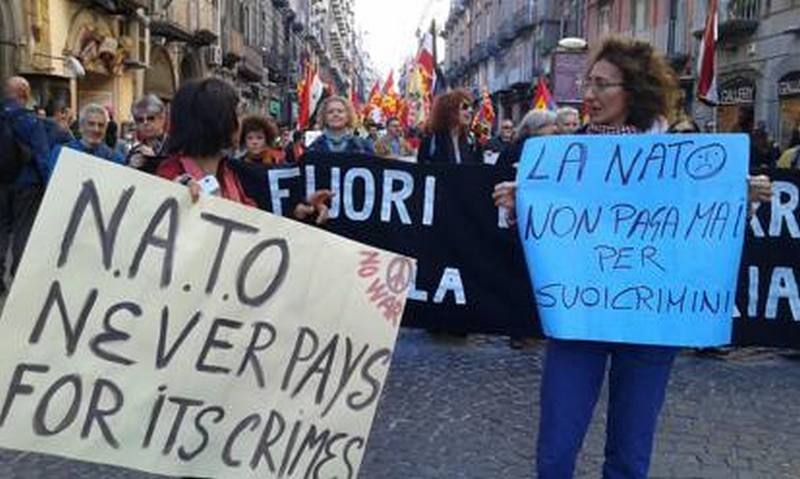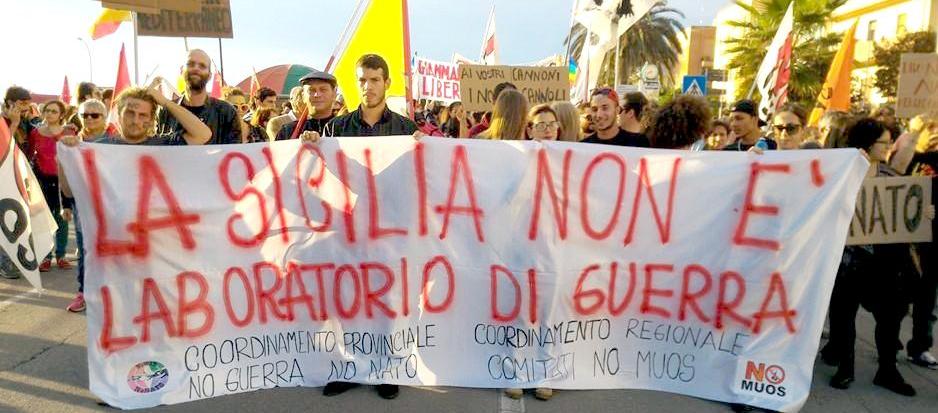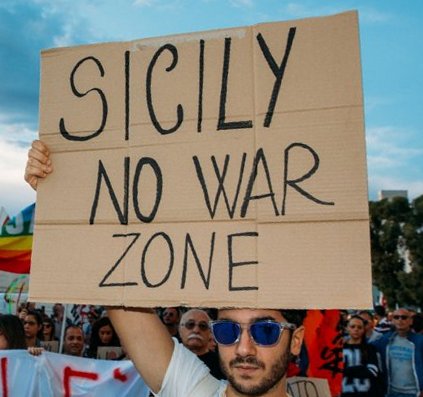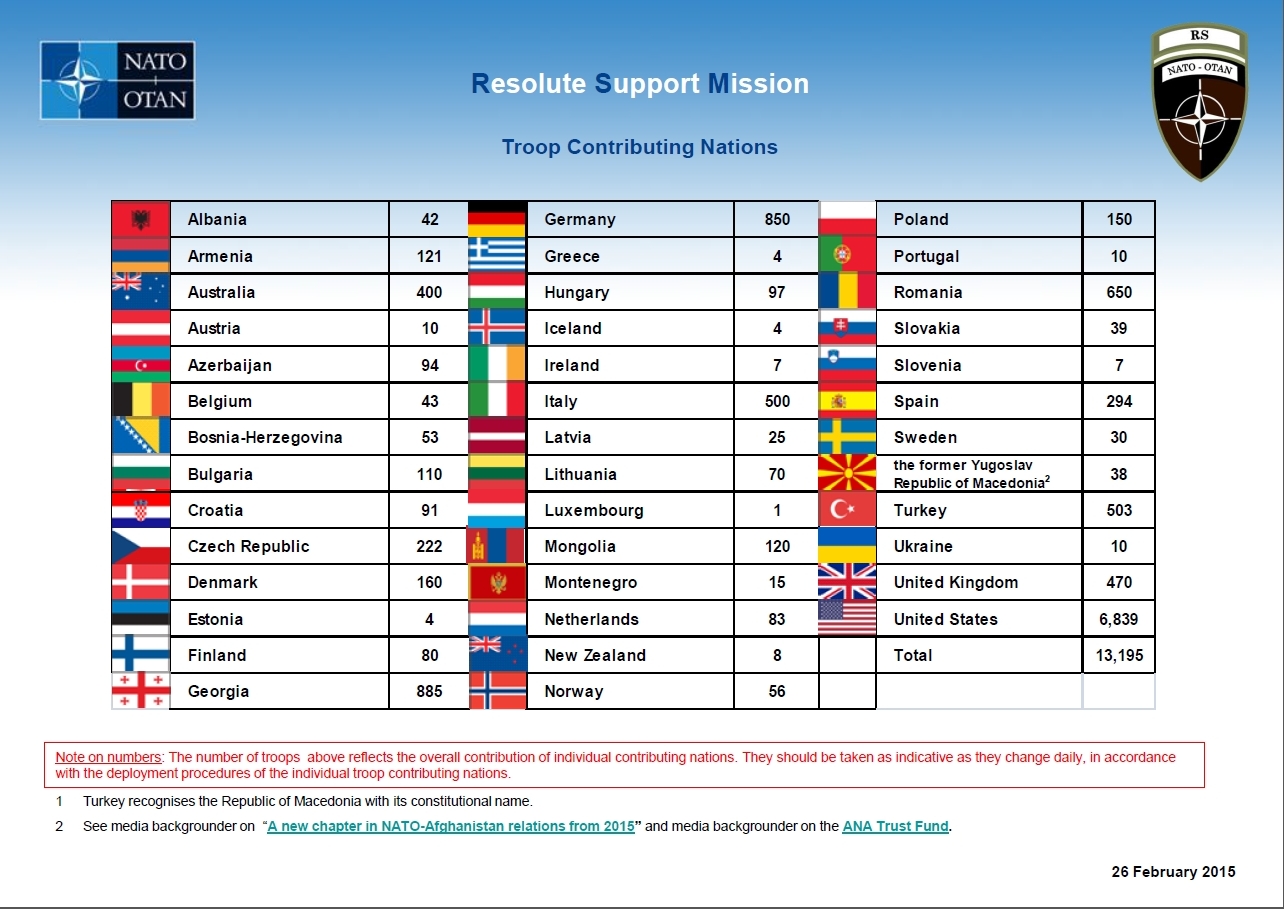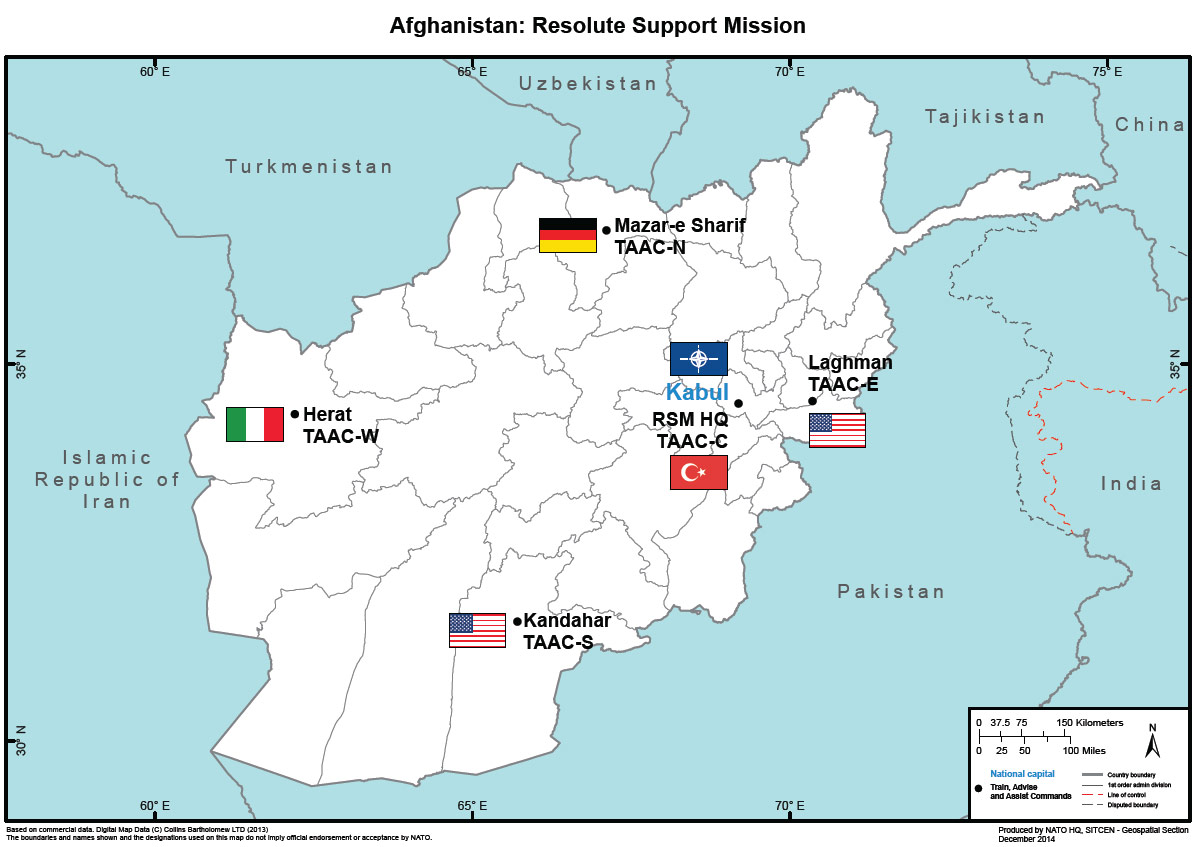
|
November 11, 2015 - No. 35 Affirm the Demand
for an
|
|
The 7th annual Halifax International Security Forum (HISF) will be convened on November 20-22 as a platform for warmongering and empire building of U.S. imperialism and the NATO bloc, in which the Canadian Government is fully embroiled.
Warmongers from more than 60 countries will join Canadian Defence officials and some 300 others at the Washington, DC -based Forum "to learn from each other, share opinions, generate new ideas, and put them into action."
In a November 4 press release the President of the HISF, Peter Van Praagh, welcomed the changing of the guard in Ottawa. "We applaud Prime Minister Trudeau for appointing such a strong and diverse team of leaders to cabinet."
"Halifax International Security Forum cannot happen without the support of many government departments and agencies," said Van Praagh. "I would like to thank the outgoing government of Canada for its strong support and look forward to working with our new partners, Minister of National Defence Harjit Sajjan and Minister of Innovation, Science and Economic Development Navdeep Bains, as well as our strong private sector partners from the Halifax Canada Club."
The first 2009 forum was dedicated to popularizing NATO's then new "security doctrine." Ensuing forums have provided a stage to justify NATO's "humanitarian intervention" in Libya and Africa, Syria and Iran. This forum will no doubt further the dark plans of NATO to attack and destroy the Assad government in Syria under the guise of destroying ISIL "Islamic terrorism", and to use Ukraine as a battering ram and platform on which to foster major aggression against Russia.
The warmongering forums also form the venue for the United States to form new military arrangements to integrate the Canadian Forces under its command. In 2009, U.S. Secretary of State Robert Gates announced that U.S. Marines would henceforth exercise in the Arctic to "defend Canadian sovereignty." In 2011, U.S. Secretary of Defense Chuck Hagel announced that Canada had signed a still secret protocol to join Obama's Asia Pivot strategy aimed at China and the Democratic People's Republic of Korea.
The forum has increasingly put on the table the issue of "energy security" -- to ensure that Canadian oil and gas production and export conform with the plans of the U.S. and NATO, in which energy is viewed as a weapon against rival powers such as Russia. Taking into account Fortress America or Fortress North America, the security perimeter agreement, part of the SPP, as well as the TPP, and CETA agreements, their program is a union of North American monopolies in which all the working class and the resources of Canada and Mexico are annexed by the USA so as to compete more effectively with Europe for the domination of Asia.
The HISF is a 100 per cent U.S. operation, lock, stock and barrel, paid for by millions of our tax dollars handed over by the Canadian government to the U.S. organizers. The agenda is one of nation-wrecking and the usurping of decision-making in the sphere of foreign and military policy of Canada, as shown by the fact that the offices of the HISF are located at 1717 Rhode Island Avenue NW, Washington, DC. This necessitates the elimination of the opposition and resistance of the workers and peoples including the First Nations to the unrestrained plunder of our land, labour and resources.
It is unacceptable that Halifax, or any Canadian city, be used as a venue to plan further crimes against the peace and the peoples of the world. Bring your banners, bring your music and statements, and most of all bring your friends to oppose this war conference.
Hands
off
Syria
&
Iraq!
Hands off Palestine & Ukraine!
War Criminals - Out of Halifax!
Canada Out of NATO & NORAD!
Dismantle NATO!
We Need an Anti-war Government!
No Harbour for War!
98th Anniversary of the Great October Socialist Revolution
Build the Communist Party and Proletarian Front!

Lenin declares the victory of the socialist revolution at the Second All-Russia Congress of Soviets at the Smolny Institute in Petrograd, November 7, 1917. (D. Nalbandyan)
November 7 marks the 98th anniversary of the Great October Socialist Revolution led by V.I. Lenin. The October Revolution shook the old world to its roots and brought a new one into being. Its victory signalled the end of the First World War, a terrible war being fought between imperialist countries for the re-division of the world.
The October Revolution created the first socialist state and the conditions for the development of Soviet power, a nation-building project led by the Proletarian Front. Immediately, the working class and peasantry led by the Communist Party withdrew Russia from World War I and began to settle scores with its own imperialist bourgeoisie and feudal landlord class. The Proletarian Front with its organized self-defence contingents that eventually became the Red Army routed the police forces and military of the Russian imperialist bourgeoisie and landlords, which were aided by a military intervention of fourteen countries.
The new country began to construct socialism not with empty policy objectives but with deeds that guaranteed the people public education, health care, basic humane living conditions and control over their economic and political affairs, which were all unprecedented achievements. Soon the country was industrialized giving it a material base to meet the needs of the people and to defend itself from imperialist aggression.
The Soviet Union forged an unforgettable position in the annals of the people's history for annihilating the Nazi hordes who stormed into the country in 1941. The Soviet peoples through their heroic struggle led by the Communist Party made the greatest sacrifice during World War Two in defeating the Axis Powers of German Nazis, Italian Fascists and Japanese militarism. The Soviet Union showed the peoples of the world that the imperialist bourgeoisie can be beaten. It can be done, if the road of Lenin and the Proletarian Front is upheld and developed.
The October Revolution of 1917, by holding high the principles of Marxism-Leninism became an event of colossal historic significance. For as long as those principles were upheld and developed, the socialist nation-building project of the Union of Soviet Socialist Republics flourished and was a beacon of hope and inspiration for the peoples of the world encouraging them to grasp its Leninist principles firmly, to organize and win victory in their struggle for the new. The path of the October revolution is as valid, fresh and necessary today as it was in 1917. Only when its principles were abandoned in the Soviet Union and abroad did the workers' nation-building project collapse, and the world went into a retreat of revolution.
Together, Let Us Open Society's Path to Progress
Following the demise of the former Soviet Union and
former people's democracies, the imperialist bourgeoisie was extremely
cocky and exuded confidence that its nightmare of 1917 had ended.
However, the results of its reactionary shock therapy, reforms and
striving for world domination failed to prove its claim of the
superiority of the capitalist system over the socialist system.
Experience has confirmed that the results of the restoration of
capitalism and bourgeois rule of law in the former Soviet Union and
former people's democracies cannot extinguish the achievements of the
Great October Revolution. They have not vanished; they live on in the
present in the heroic efforts to uphold Leninist principles to open
society's path to progress.
The dark period of retreat of revolution across the globe is not a permanent state of affairs. The struggle of the proletariat and oppressed peoples of the world against monopoly right and the vicious capitalist anti-social offensive and predatory wars carried out under the guise of globalization, free trade, economic competitiveness and deceptive slogans such as "responsibility to protect" is alive and well.
The 98th anniversary of the Great October Socialist
Revolution comes 24
years since the collapse of the former Soviet Union. Humanity can
clearly see
the profound crisis in which the U.S. striving for world domination is
mired.
Also clear to all, the rule brought into being in Russia and eastern
European
countries since capitalism was re-established has not provided the
promised
prosperity and security to the peoples. The bourgeois euphoria has long
expired. The Rule of Law established and re-established in those
countries
replaces one form of corruption with another. Meanwhile, the peoples
who
have been disenfranchised see no end to the conflicts or worsening
conditions,
which even flare up into reactionary bloody civil wars such as in the
Ukraine.
Today, anarchy and chaos prevail in all spheres of the economy,
politics, and
social and cultural life. The countries that abandoned the path of the
October
Revolution are mired in all the ills of the capitalist system: poverty
on one
pole and fabulous oligarchic riches on the other, and a broad
marginalization
of people from their economic and political affairs.
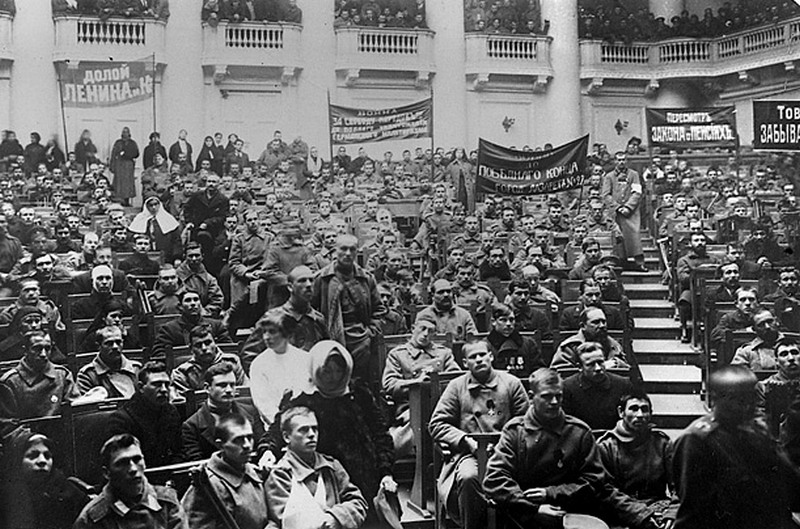
Meeting of the Petrograd Soviet in 1917. The Soviet was established March 12, 1917 after the February Revolution as a representative body of the city's workers and soldiers and instrument of their political power. It established the Petrograd Military Revolutionary Committee on October 25, 1917 to prepare for the revolution on November 7.
Besides the damaging reality, the lessons of the October Revolution and its Leninist principles are not taken seriously. The persistence in sticking to social democratic prescriptions runs deep, infecting the working class movement profoundly not only in Europe but throughout the world. Social democrats contend government is the ultimate state power, which must be captured to implement socialist policy objectives. Falling short of gaining government status, they argue, the working class and its allies must pressure or lobby the existing government power to be pro-social. This political line of the parliamentary road to socialism is embedded within the imperialist countries. Only Lenin stood staunchly opposed to it and led the Russian proletariat and peasants to victory in the October Revolution, which of course became the scourge of the social democrats in alliance with the Nazis who did everything to destroy the working class nation-building project and its positive influence on the world.
Within the imperialist countries including the Soviet Union after the death of Stalin, the betrayal of Marxism-Leninism and adoption of one or another variant of pragmatism was profound and widespread. The leader of the Communist Party of Canada (Marxist-Leninist) Hardial Bains waged a determined struggle to rescue the banner of Marxism-Leninism and its principles. He upheld the Leninist conclusion that the government is one institution within the state and not the most powerful by any means. The ultimate power is the police power which establishes various layers of secret organization comprised of private interests whose instruments include a political police and spy agencies, among others. The police power controlled and led by the ruling imperialist bourgeoisie will not allow socialism to succeed without a bloody fight.
 Any serious government
considering socialism as more
than a policy
objective has to contend with the police power. The police power is the
centre
of power of the imperialist bourgeoisie. The only force capable of
dealing with
the police power and overcoming it is the Proletarian Front led by the
Communist Party. Reluctance to build the Proletarian Front is endemic
within
the imperialist countries due to many factors including importantly the
ideological pressure from the ruling elite, in particular pragmatism,
and the
abundance of social wealth stolen from the oppressed countries that can
be
used to bribe working class leaders and intellectuals.
Any serious government
considering socialism as more
than a policy
objective has to contend with the police power. The police power is the
centre
of power of the imperialist bourgeoisie. The only force capable of
dealing with
the police power and overcoming it is the Proletarian Front led by the
Communist Party. Reluctance to build the Proletarian Front is endemic
within
the imperialist countries due to many factors including importantly the
ideological pressure from the ruling elite, in particular pragmatism,
and the
abundance of social wealth stolen from the oppressed countries that can
be
used to bribe working class leaders and intellectuals.
From revolution to counter-revolution, history has its own twists and turns and our responsibility is to ensure we contribute to opening society's path to progress. On this important occasion, the Communist Party of Canada (Marxist-Leninist) expresses its complete confidence that humankind will always look back with admiration and respect to the days of October of the year 1917, when proletarian salvoes were fired marking the dawn of a new world.
History will assuredly experience once again revolutions of the calibre of the Great October Socialist Revolution. The Marxist and Leninist classics remain a living guide to turn the successes humankind has achieved to date into lasting victory. Our confidence in the working class and the human factor/social consciousness inspires us to build the Communist Party and Proletarian Front as the necessary subjective condition for revolution.
War Crimes in Afghanistan
Get Canada Out of Afghanistan!
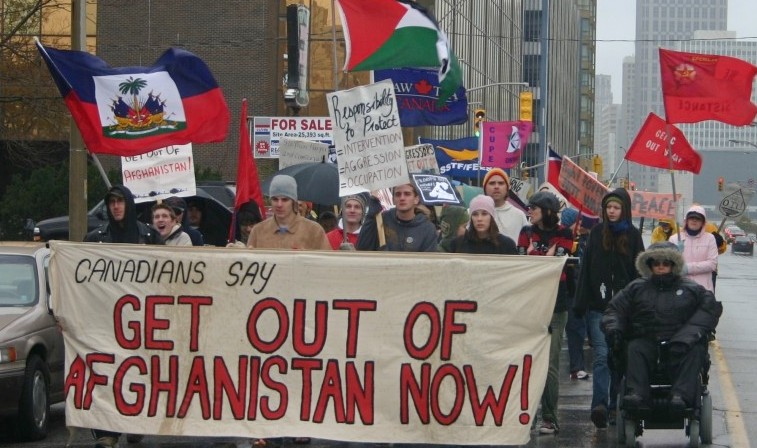
Canadians were led to believe that Canada's military operations in Afghanistan had ended. Books have even been written on the lessons learned, creating the impression that the savage destruction of that country started right after 9/11 by the U.S. is over. The mantra is that Canada played a constructive role and follow-up is needed to "ensure Afghanistan doesn't go back to being a haven for terrorism."
The destruction by U.S.
forces of a Médecins San
Frontières (Doctors
Without Borders) hospital on October 3 has brought what is really going
on
in Afghanistan to the fore. At least 30 staff and patients were killed
in an
operation that blatantly violated international humanitarian law. This
happened
during the recent federal election but none of the so-called major
parties,
including the Liberal Party which formed the government, denounced this
crime. A damning new report released November 5 contains even more
evidence from survivors and confirms that the hospital was deliberately
targeted time and time again.
The new Minister of Defence Harjit Singh Sajjan was
deployed three times
to Afghanistan. An intelligence officer, he is reported to have been
instrumental in re-orienting and focusing the campaign to wipe out the
resistance in Afghanistan, which is referred to as "the Taliban" (the
country's former government), "thugs" or "drug dealers" to cover up the
real nature of the conflict in that country and that the thugs and drug
dealers are really creations of the foreign invaders or in their pay.
Meanwhile, what emerges are stories of murder, torture and
dehumanization of the Afghan people, especially those who dared to say
No! to the U.S.-led invasion and resisted it.
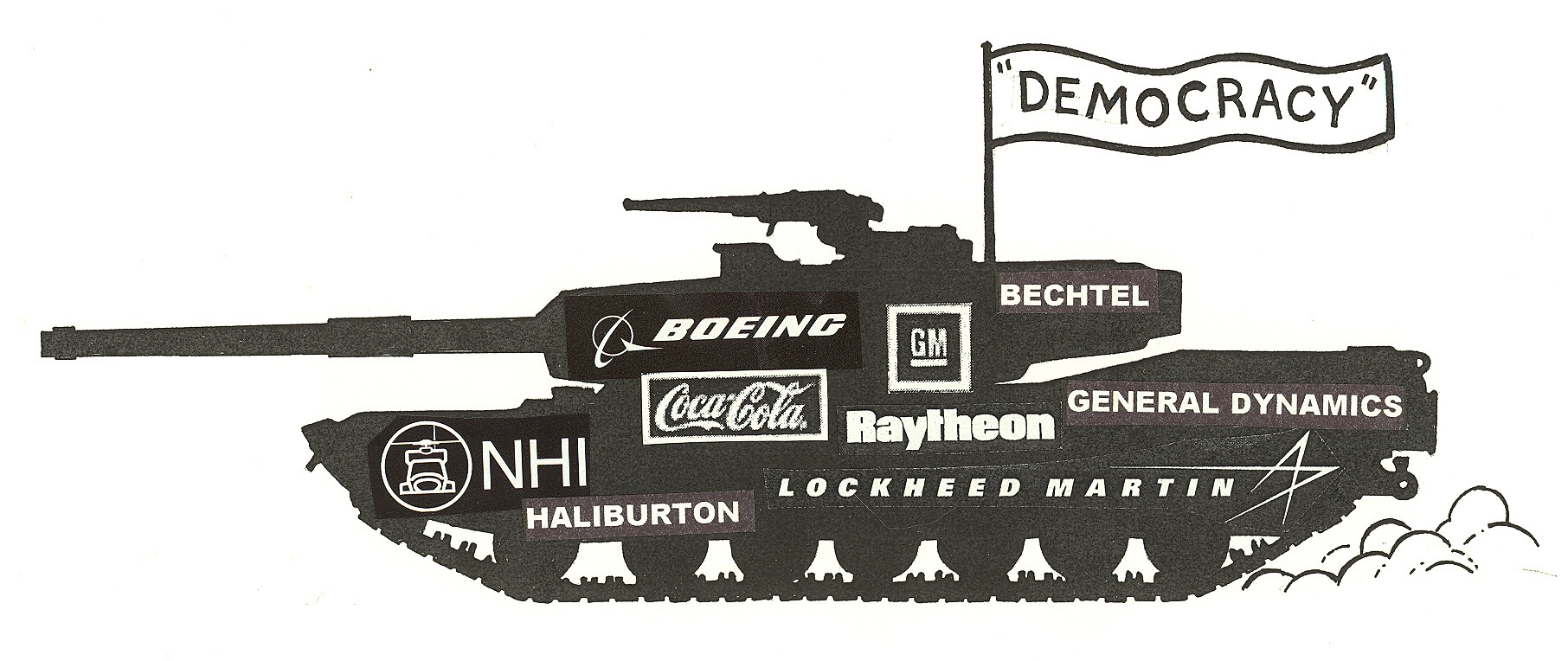 Talk of peace operations and operations to protect
coalition forces covers
up the aim of the foreign armies, police and diplomats. The idea that
"we"
have to "help" the Afghanis is to hide that it was the U.S.
imperialists, with
Canada joined to them at the hip under the Chrétien Liberals,
who launched
an illegal, immoral and criminal war of aggression against that
sovereign
nation to achieve "regime change." This was done under false high
ideals
based on the deception that Afghanistan was responsible for the attacks
on
9/11. The campaign to mete out collective punishment to an entire
nation and
its people based on lies is an act of barbarism that Canada has been
involved
in since the beginning.
Talk of peace operations and operations to protect
coalition forces covers
up the aim of the foreign armies, police and diplomats. The idea that
"we"
have to "help" the Afghanis is to hide that it was the U.S.
imperialists, with
Canada joined to them at the hip under the Chrétien Liberals,
who launched
an illegal, immoral and criminal war of aggression against that
sovereign
nation to achieve "regime change." This was done under false high
ideals
based on the deception that Afghanistan was responsible for the attacks
on
9/11. The campaign to mete out collective punishment to an entire
nation and
its people based on lies is an act of barbarism that Canada has been
involved
in since the beginning.
The U.S./NATO intervention has not brought peace or stability. The invasion and the subsequent destruction of the country were and are acts of war. Canadians never accepted Canada's presence in Afghanistan and demand that Canada get out of Afghanistan now!
Canada's Continued Involvement in Afghanistan
One front of Canada's ongoing military operations in Afghanistan is being carried out under the guise of providing security or some other "support" for staff at the Canadian embassy. It is a secret operation, showing that when it comes to what Canada's forces do abroad in Canadians' name, there is no transparency or accountability. This begs the question, however, of why a security detail being provided by Canadian forces at an embassy is classified as a military "operation" -- and a secret one at that -- rather than as a security detail as it is in other places? It would likely be difficult for the Canadian government to openly state that Canada is sending a military force into a war zone to lead its diplomacy. Canadians would not accept such a thing.
Canadians overwhelmingly oppose military aggression against Afghanistan. Parliament voted to end the military mission. Canada's training mission Operation Attention was said to have officially ended in March 2014 and its combat mission, Operation Athena, in 2011. With the secrecy surrounding the ongoing placement of an unknown number of Canadian troops in Afghanistan, it appears that the end has not really meant the end.
An article in Embassy magazine by Marie-Danielle Smith reports that Captain Kirk Sullivan, a spokesperson for the Canadian Armed Forces, told them in an e-mailed statement that members of the military are deployed at the request of Foreign Affairs, Trade and Development Canada. They are "serving in support functions at the Canadian Embassy" and "also serve in a variety of individual exchange positions with allied forces in Afghanistan."
In other words: nothing to see here; we are just supporting Canadian diplomats and engaging in some exchanges with allied forces. The kind of support and exchange, of course, is not discussed in the name of "national security." We are just to trust that it is for good reasons, rather than bad. The spokesperson added that Canadians regularly deploy for assignments with multilateral groups such as NATO or exchanges with allied troops.
Here we have it. Just a "routine assignment" at the
embassy or with a
"multilateral group." This makes the aggressive military alliance NATO
-- the
gendarme of the U.S. in Afghanistan -- sound like a legitimate
multilateral
organization, like the UN, rather than the main force for imperialist
aggression
in Asia and Eastern Europe, and its activities synonymous with
"diplomacy"
and "foreign affairs" rather than terror and destruction.
"Exchange" is the term used when members of the Canadian Forces are assigned to work inside and as part of another country's military for a period of time. An exchange with the U.S. military for example allowed Canada to play a direct part in the Iraq war while "remaining out of it." While on exchange during 2004 and 2005, prior to becoming Canada's Chief of the Defence Staff, Walter Natynczyk served as Deputy Commanding General of 35,000 U.S.-led "coalition" forces in Iraq. With respect to the current operation, who is on exchange and to do what remains to be seen. Canadians are supposed to simply sit back and "wait and see" in the hopes that it is more "good" than "bad," or that it is "peacekeeping" as opposed to "war making" although these are virtually synonymous today.
The Embassy article continues: "Asked how many troops are participating in the secret operation, Capt. Sullivan wouldn't say. 'The number is limited,' he offered, and 'in order to maintain operational security and to ensure the safety of Canadian Armed Forces personnel, no further information is available at this time.'
"According to a news report from CTV in April 2014, at least 16 soldiers were to leave in May for a six-month deployment called Operation Addenda.
"Assuming that this is the same operation, that initial six months has turned into more than a year and a half. Capt. Sullivan confirmed that no specific end date is foreseen for the mission."
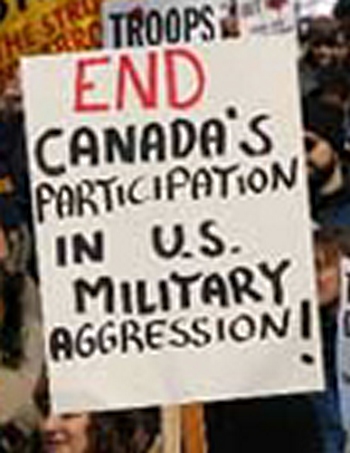 Undermining the assertion
that the mission is being kept
secret for reasons
of security, the article states: "Operation Addenda seems to be the
only one for
which no information is publicly available -- aside from a mailing
address that
families and friends can use to get mail to deployed soldiers."
Undermining the assertion
that the mission is being kept
secret for reasons
of security, the article states: "Operation Addenda seems to be the
only one for
which no information is publicly available -- aside from a mailing
address that
families and friends can use to get mail to deployed soldiers."
Embassy reported in June on another role that Canada is playing to support its allies in Afghanistan. A vacant property held by the Canadian government near the embassy was being used as a helicopter landing site for Western militaries. Would those be Apache helicopters used for night raids and bombing missions perhaps? We are not to ask of course as this is all part of "helping allies" and "being responsible allies in military affairs."
The website of Canada's embassy in Kabul sheds no light on the situation. It contains only general information and nothing to indicate what Operation Addenda might involve. It says that while its military mission has ended, Canada will continue to play an important role through the embassy "in supporting efforts toward a better future for all Afghans." It says Canada's "engagement" up to 2017 will focus on "increased investments in education, maternal, newborn and child health, and the rights and empowerment of women and girls; advancing security, democracy, rule-of-law and human rights and contributing to the capacity development for the management of humanitarian assistance." An additional $227 million has been committed to 2017 for what is called development assistance and $330 million to a fund to help sustain the Afghan National Security Forces.
Get Canada Out of Afghanistan, Now!
Allegations of War Crimes Committed by
Canadian Military
Canada's Military Police Complaints Commission (MPCC) has announced it is conducting a public interest investigation into allegations that members of the military police abused and terrorized Afghan detainees held in a detention centre at Kandahar Airfield at the end of 2010 and the beginning of 2011.
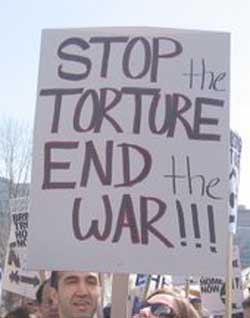 It is alleged that during
that time period, the
commanding officer of the
military police detachment at Kandahar Airfield ran "exercises" in
empty
detention cells next to those holding detainees in order to terrorize
them. It is
also suggested that in the middle of the night police with weapons
entered the
cells where some detainees were held, pressed them against the wall and
floor
and twisted their arms behind their backs in an arm lock. "The
complainant
alleges the tension was so high after the previous two months that
several
detainees defecated and urinated on the spot," MPCC chair Hilary
McCormack
wrote in a decision letter released November 5.
It is alleged that during
that time period, the
commanding officer of the
military police detachment at Kandahar Airfield ran "exercises" in
empty
detention cells next to those holding detainees in order to terrorize
them. It is
also suggested that in the middle of the night police with weapons
entered the
cells where some detainees were held, pressed them against the wall and
floor
and twisted their arms behind their backs in an arm lock. "The
complainant
alleges the tension was so high after the previous two months that
several
detainees defecated and urinated on the spot," MPCC chair Hilary
McCormack
wrote in a decision letter released November 5.
According to the report, the MPCC is also investigating why the military's supposedly independent police unit, the National Investigation Service (NIS), didn't lay charges in the case or convene any court martials, even though it had the mandate and power to do so. "Charges were allegedly provided to the Canadian Armed Forces (CAF) Task Force Commander who, according to the complainant, ignored them," McCormack writes. The commander in question was Brigadier-General Dean Milner who is now a major-general and commander of the army's 1st Canadian Division. "The NIS is supposed to exercise its investigative power outside the chain of command, not with deference to it, or even in consultation with it," and "there was a perception on the part of some of the members deployed to Kandahar Airfield at the time that some of the decisions made about the investigations and their ultimate outcome were made as a result of orders coming from 'Ottawa' and/or because of concerns about the reputation of the [military police] or CAF in light of the public attention issues involving the treatment of detainees can receive," James Cudmore of the CBC writes.
The allegations of abuse of Afghan detainees and of a possible cover-up were made anonymously to the MPCC in a one-page typewritten letter sent from an airport hotel in February, which the commission considered to be an indication the writer feared reprisals if he/she identified themselves. The names of five individuals said to be witnesses to the events in question were however provided as references by the writer and they were contacted by the MPCC leading to two other witnesses being identified as well.
"The information received from these individuals
confirmed that an
incident did occur at the Detainee Transfer Facility in Kandahar in the
time
period alleged and raised several additional questions," McCormack
writes.
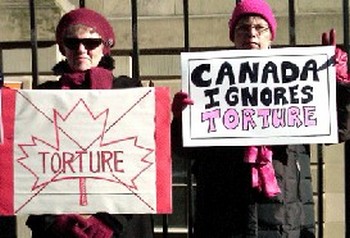 At the time the alleged
abuse was taking place the MPCC
was holding
high profile hearings into allegations the Canadian army had
transferred
detainees to Afghan intelligence and justice officials knowing they
faced the
likelihood of torture. In its final report, issued in 2012 the
Commission cleared
the military police of wrongdoing.
At the time the alleged
abuse was taking place the MPCC
was holding
high profile hearings into allegations the Canadian army had
transferred
detainees to Afghan intelligence and justice officials knowing they
faced the
likelihood of torture. In its final report, issued in 2012 the
Commission cleared
the military police of wrongdoing.
Paul Champ, a lawyer who participated in those hearings on behalf of Amnesty International and the BC Civil Liberties Association, is reported to have said in an interview regarding the new allegations, "If these incidents occurred as described, it is clearly a violation of the Geneva Convention and a violation of international law."
"At that time, the Canadian military police chain of command would have been very alive to the sensitivity of the handling of detainees, and moreover the Canadian Forces senior command would have been alive to the sensitivity of it, and yet it appears they carried out this completely shocking operation," Champ said.
The U.S. military has been known to use the same tactic, Champ said, adding that he was "quite surprised" to learn Canadians may have adopted it.
(CBC, CP)
Bombing Hospitals Is a War Crime
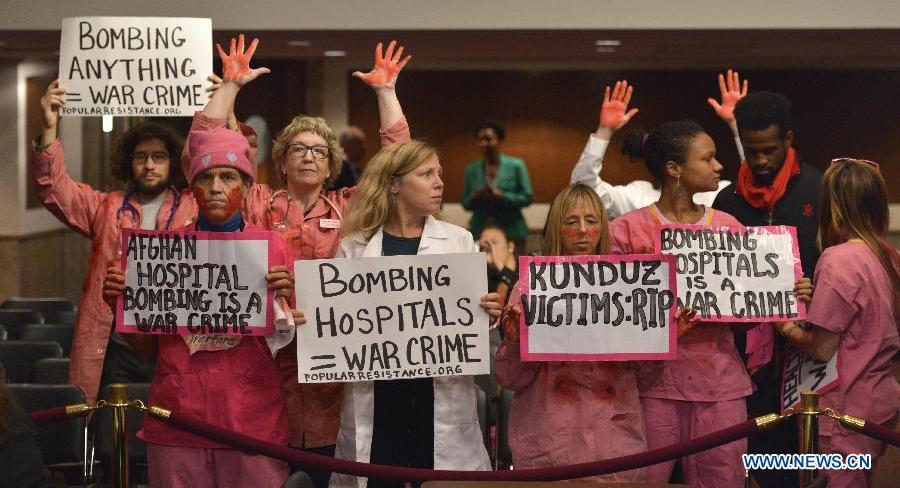
Washington, D.C. Meeting of the U.S. Armed Services Committee, October 6, 2015. Anti-war activists protest U.S. bombing of the Médecins Sans Frontières hospital in Kunduz, Afghanistan.
A damning report was released on November 5 based on an internal review by Médecins Sans Frontières (MSF) of the war crime carried out by U.S. forces at their hospital in Kunduz, in northern Afghanistan on October 3. A U.S. AC-130 gunship repeatedly bombed the trauma hospital run by MSF, killing at least 30 staff and patients including three children. Some people remain missing while bodies are unidentified. Thirty-seven others were injured and key parts of the facility were destroyed.
U.S. special forces claim they called in the air strikes
against the hospital
to target "Taliban insurgents" who they said were firing on U.S. forces
on the
ground. This claim constitutes an open admission of a war crime in
violation
of all norms of international humanitarian law which prohibits
targeting
non-combatants, not to mention non-combatants receiving medical
treatment.
The fact that there were agreements by the resistance and the
government of
Afghanistan that the hospital was neutral and would not be targeted
makes the
attack that much more brazen and heinous.
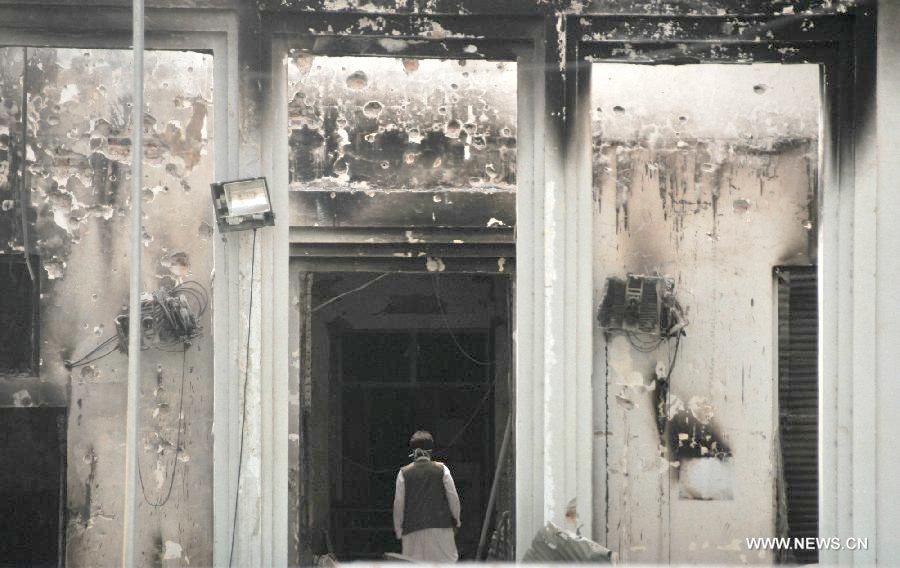
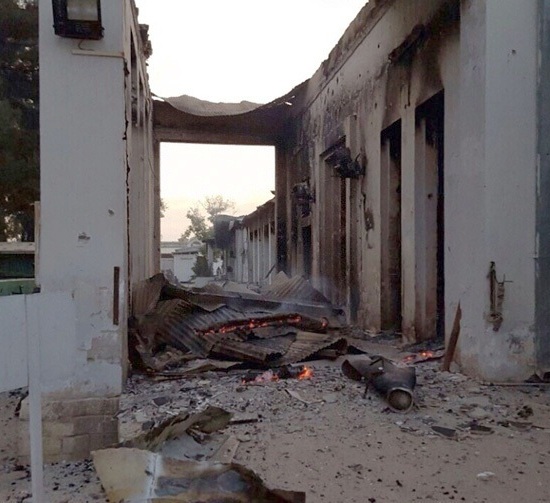
Massive damage from the U.S. bombing of the Médecins San Frontières hospital in Kunduz, Afghanistan, October 3, 2015.
The MSF report clearly states there were no armed combatants in the hospital, only those receiving treatment, and there was no fighting coming from or around the facility at the time of the bombing that continued for at least an hour. It further states that the main hospital building where medical personnel were caring for patients was "repeatedly and very precisely hit during each aerial raid." The specific building of the hospital targeted correlates exactly with the GPS coordinates provided by the MSF to the parties to the conflict who had all previously agreed to respect the neutrality of the medical facility.
The strikes continued for 40 minutes after hospital staff made the first of several calls to American and Afghan military officials in Washington and Kabul telling them the hospital had been struck and begging them to call off the bombing. The report describes patients burning in their beds, medical staff being decapitated or losing limbs, and others being shot from the air as they fled the burning building.
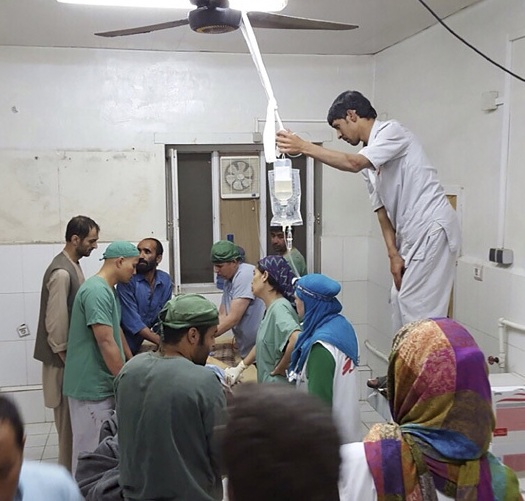 MSF personnel in Kunduz courageously continue their work in the aftermath of the bombing, October 3, 2015. |
True to form, the U.S. has refused to consent to an independent investigation as demanded by MSF and others who consider the bombing of the hospital a war crime and violation of international humanitarian law. According to the U.S., investigations by the Pentagon, NATO and Afghan authorities are sufficient to establish what happened and why, and to take appropriate action.
Adding insult to injury, on October 15, an armoured vehicle full of these investigators arrived unannounced at the destroyed hospital and crashed through its gates to gain entry. In a statement, MSF said the investigators destroyed potential evidence, damaged property and caused stress and fear among members of its executive who happened to be in the facility at the time.
It is clearly up to the peoples of the world to hold the U.S. to account for this terrorist attack, another in the long list of crimes they have committed in Afghanistan in the name of freedom and democracy. Meanwhile governments like Canada's appear to condone such actions with their silence and their own continued participation alongside their ally, the U.S. It must not pass!
The public release of the initial MSF internal review is
available here.

MSF personnel in Helmand, Afghanistan join in the international demand for an independent investigation into the bombing.
(Photos: MSF, Xinhua)
NATO's Ongoing Role
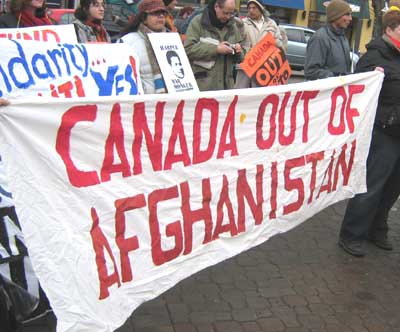
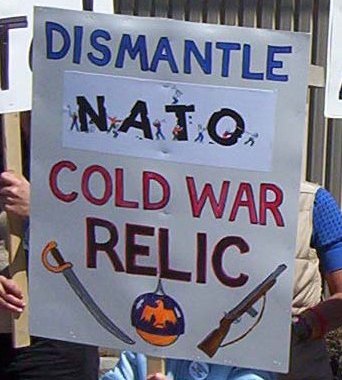
NATO continues its dirty work in Afghanistan, launching its new Resolute Support mission in January 2015, to take over as its International Stabilization Assistance Force (ISAF) mission ended. Resolute Support, commanded by U.S. General John Campbell, involves over 13,000 troops from 42 countries, including 6,800 from the U.S. While it is described as a non-combat mission, its U.S. commander is also the commander of his own military's counter-terrorism operation that involves some 3,000 special operations forces -- presumably the ones responsible for bombing the hospital in Kunduz on October 3. These are the death squads and assassination teams whose true numbers and activities are often not reported publicly.
According to NATO, Resolute Support involves "providing training, advice and assistance in eight key areas: multi-year budgeting; transparency, accountability and oversight; civilian oversight of the Afghan security institutions; force generation; force sustainment; strategy and policy planning, resourcing and execution; intelligence; and strategic communications." Of course accountability for their crimes is not on the agenda of the NATO forces, which is precisely what will ensure that Afghanistan will not be permitted to set its own path.
NATO member countries, like Canada, that are not
contributing troops
directly to Resolute Support are still part of the overall NATO mission
in
various ways. These include financing the Afghan National Defence and
Security Forces (ANSF), which the U.S. is leading in the name of
training
them, and with the placement of Canadian armed forces in Afghanistan as
part
of an ongoing operation that cannot be talked about "for reasons of
national
security."
U.S. Involvement
The U.S. had said it would withdraw all but a small embassy-based force of 1,000 troops from Afghanistan by the end of 2016. However, on October 14, less than two weeks after the Kunduz massacre, President Obama announced troop numbers would remain at 9,800 for most of 2016 "because of renewed threats from the Taliban." It must be kept in mind that the entire NATO mission of 42 countries is made up of 13,000 troops. Clearly the NATO mission is a U.S. mission, which uses NATO to force the participation of its "allies."
The U.S. military claims it is presently involved in two separate missions: training, advising, and assisting the ANSF as part of NATO's Resolute Support Mission, and hunting down the remnants of Al Qaeda. The latter is covered under a U.S.-Afghanistan Bilateral Security Agreement (BSA) that is to remain in force "until the end of 2024 and beyond" unless it is terminated by either side. Under the agreement U.S. counterterrorism operations are intended to "complement and support" those of the Afghan government. U.S. forces continue to be immune from Afghan law if they commit any criminal or civil offences in the country.
Describing U.S. and NATO actions in Afghanistan as
"missions" is to fool
the gullible into thinking that U.S. imperialism does "some good" and
"some
bad." It is to hide its sinister aims and block the formation of public
opinion
against the war aims of the U.S.
40th Anniversary of Cuba's Operación Carlota
Paying the Debt to Africa
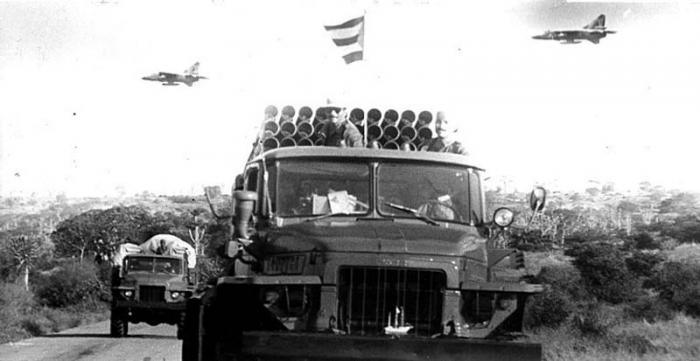
"The Cuban people hold
a special place in the hearts of
the peoples of
Africa. The Cuban internationalists have made a contribution to African
independence, freedom and justice, unparalleled for its principled and
selfless
character...Cubans came to our region as doctors, teachers, soldiers,
agricultural experts, but never as colonizers. They have shared the
same
trenches with us in the struggle against colonialism, underdevelopment,
and
apartheid."
--
Nelson
Mandela
November 5, 2015 marks the 40th anniversary of the start of Operación Carlota, Cuba's 15-year mission to defend Angola's independence, which played a decisive role in southern African national and anti-colonial liberation struggles. Cuba's extensive and decisive role in the struggle against the apartheid regime in South Africa is marginalized in the dominant western discourse and narratives. Cuba's critical contribution is not only frequently ignored, it is treated almost as if it had never occurred. However, the overarching significance of Cuba's role cannot be erased.
Havana initiated Operación Carlota on November 5th, 1975, in response to a direct and urgent request from the government of Angola. Having just achieved independence after a long and brutal anti-colonial struggle, Angola confronted an invasion by racist South Africa. South Africa was determined to destroy the Black government of the newly independent Angola. Operación Carlota was decisive in not only stopping the South African drive to Luanda (the capital) but also in pushing the South Africans out of Angola. The defeat of the South African forces was a major development in the southern African anti-colonial and national liberation struggle. At the time, The World, a Black South African newspaper, underscored the significance: "Black Africa is riding the crest of a wave generated by the Cuban success in Angola. Black Africa is tasting the heady wine of the possibility of realizing the dream of "total liberation."
Named after the leader of a revolt against slavery that took place in Cuba on November 5, 1843, Operación Carlota lasted more than 15 years. During that time, more than 330,000 Cubans served in Angola. More than 2,000 Cubans died defending Angolan independence and the freedom and right of self-determination of the peoples of southern Africa.
Africa's Children Return!
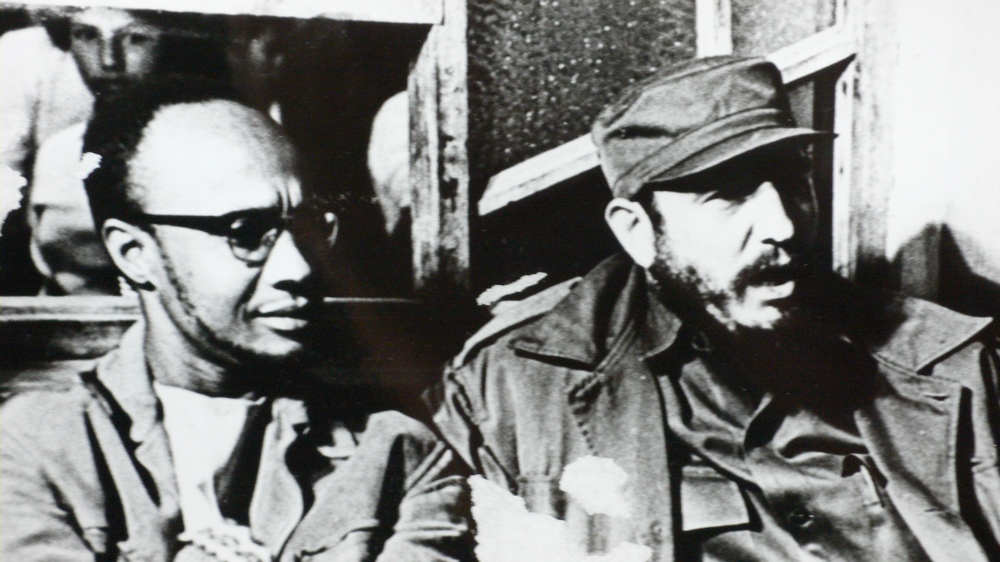 Amilcar Cabral and Fidel Castro during the tri-continental conference that gathered together resistance movements in Havana, January 1966. |
Cuba's solidarity with Angola was not simply one country coming to the aid of another, but a part of the African diaspora -- the Black world -- rising to the defence of Africa. Since the triumph of the Cuban Revolution on January 1, 1959, Cuba has engaged in ongoing solidarity with the peoples and the continent of Africa. In tribute to Cuba's assistance to African liberation struggles, Amilcar Cabral (celebrated leader of the anti-colonial and national liberation struggle in Guinea Bissau and Cape Verde) stated: "I don't believe in life after death, but if there is, we can be sure that the souls of our forefathers who were taken away to America to be slaves are rejoicing today to see their children reunited and working together to help us be independent and free."
The Cuban Revolution's involvement with Angola began in the 1960s when relations were established with the Movement for the Popular Liberation of Angola (MPLA). The MPLA was the principal organization in the struggle to liberate Angola from Portuguese colonialism. In 1975, the Portuguese withdrew from Angola. However, in order to stop the MPLA from coming to power, the U.S. government had already been funding various groups, in particular the Union for the Total Independence of Angola (UNITA) led by the notorious Jonas Savimbi. In October 1975, South Africa, with the support of Washington, invaded Angola. On November 5, 1975, the Cuban revolutionary leadership met to discuss the situation in Angola and the Angolan government's request for military assistance to repel the South African invasion force. The decision to deploy combat troops thwarted apartheid South Africa's goal of turning Angola into its protectorate.
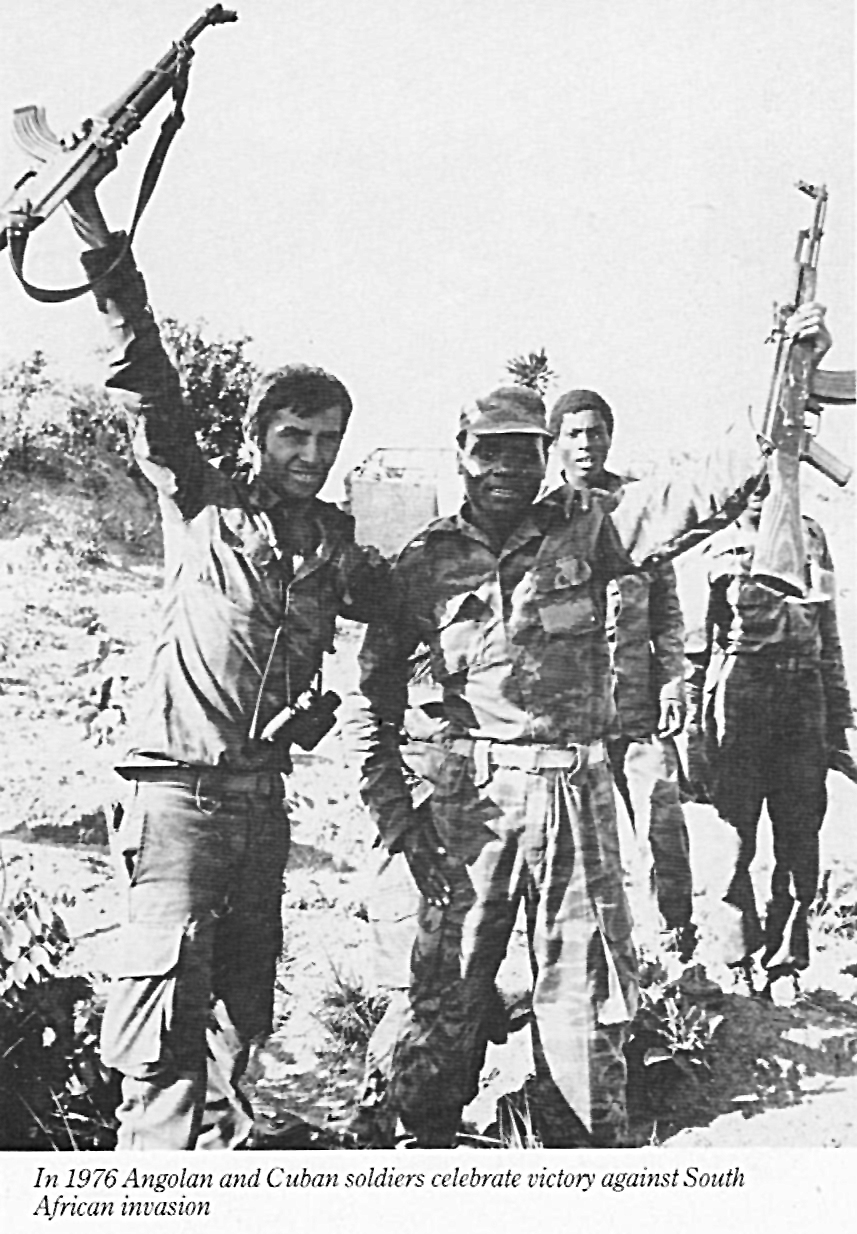 The Cuban leadership
justified the military intervention
as both defending
an independent country from foreign invasion and repaying a historical
debt
owed by Cuba to Africa. Fidel Castro frequently invoked Cuba's
historical
links to Africa. On the fifteenth anniversary of the Cuban victory at
Playa
Girón (Bay of Pigs), he declared that Cubans "are a
Latin-African people."
Jorge Risquet, Havana's principal diplomat in Africa from the 1970s to
1990s,
was also unambiguous in explaining Cuba's military intervention in
terms of
Cuba's obligations to Africa, and this linkage resonated especially
with black
Cubans, who were able to make a symbolic connection with their African
roots. As Cuba specialist Terrence Cannon noted, for many blacks
fighting in
Angola
was akin to defending Cuba except that the fight was "this time in
Africa. And
they were aware that Africa was, in some sense, their homeland."
Reverend
Abbuno Gonzalez underscored this connection: "My grandfather came from
Angola. So it is my duty to go and help Angola. I owe it to my
ancestors."
General Rafael Moracen echoed this sentiment and the words of Amilcar
Cabral: "When we arrived in Angola, I heard an Angolan say that our
grandparents, whose children were taken away from Africa to be slaves,
would
be happy to see their grandchildren return to Africa to help free it. I
will
always remember those words."
The Cuban leadership
justified the military intervention
as both defending
an independent country from foreign invasion and repaying a historical
debt
owed by Cuba to Africa. Fidel Castro frequently invoked Cuba's
historical
links to Africa. On the fifteenth anniversary of the Cuban victory at
Playa
Girón (Bay of Pigs), he declared that Cubans "are a
Latin-African people."
Jorge Risquet, Havana's principal diplomat in Africa from the 1970s to
1990s,
was also unambiguous in explaining Cuba's military intervention in
terms of
Cuba's obligations to Africa, and this linkage resonated especially
with black
Cubans, who were able to make a symbolic connection with their African
roots. As Cuba specialist Terrence Cannon noted, for many blacks
fighting in
Angola
was akin to defending Cuba except that the fight was "this time in
Africa. And
they were aware that Africa was, in some sense, their homeland."
Reverend
Abbuno Gonzalez underscored this connection: "My grandfather came from
Angola. So it is my duty to go and help Angola. I owe it to my
ancestors."
General Rafael Moracen echoed this sentiment and the words of Amilcar
Cabral: "When we arrived in Angola, I heard an Angolan say that our
grandparents, whose children were taken away from Africa to be slaves,
would
be happy to see their grandchildren return to Africa to help free it. I
will
always remember those words."
Cuban involvement in southern Africa has been repeatedly dismissed as surrogate activity for the Soviet Union. This insidious myth has been unequivocally refuted. John Stockwell, the director of CIA operations in Angola during and in the immediate aftermath of the 1975 South African invasion, in his memoir, In Search of Enemies: A CIA Story, stated "we learned that Cuba had not been ordered into action by the Soviet Union. To the contrary, the Cuban leaders felt compelled to intervene for their own ideological reasons." In his acclaimed book, Conflicting Missions: Havana, Washington and Africa, 1959-76, Piero Gliejeses demonstrated that the Cuban government -- as it had repeatedly asserted -- decided to dispatch combat troops to Angola only after the Angolan government requested Cuba's military assistance to repel the South Africans, refuting Washington's assertion that South African forces intervened in Angola only after the arrival of the Cuban forces; and the Soviet Union had no role in Cuba's decision and were not even informed prior to deployment. In short, Cuba was not the puppet of the USSR. Even The Economist magazine (no friend of Cuba) in a 2002 article, acknowledged that the Cuban government acted on its "own initiative."
That Cuba could act on its own initiative, independent of the will of the great powers, was not only an anathema to Washington but also inconceivable. In 1969, Henry Kissinger, a National Security Advisor who then became U.S. Secretary of State, unambiguously and uncategorically declared "Nothing important can come from the South. History has never been produced in the South. The axis of history starts in Moscow, goes to Bonn, crosses over to Washington, and then goes to Tokyo. What happens in the South is of no importance." That Cuba -- a poor "Third World" country, a Latin-African nation -- could act on its own, and through that independent action shape history, enraged Kissinger. At his behest, a number of extensive military plans were drawn up by the Pentagon in 1975 and 1976 to specifically punish the island for daring to defy the imperial order with its racist global hierarchy. These detailed plans encompassed naval blockade to aerial bombardment to outright invasion. While they were never carried out, these options were seriously discussed and debated within the highest levels of the U.S. government, poignantly illustrating the dangers that Cuba faced and accepted during its internationalist defence of Angola.
South Africa's War of Terror
The survival of the racist South African state depended on establishing its domination of all of southern Africa. Towards this end, Pretoria had militarized the South African state, fashioning it into the sword to defend the racist system and wage a regional war of terror.
From 1975 to 1988, the South African armed forces embarked on a campaign of massive destabilization of the region. The war of destabilization wrought a terrible toll. The financial and human cost can not only be measured in direct damage and deaths but also in the premature deaths and projected economic loss caused by the destruction of infrastructure, agriculture and power networks. While it is very difficult to estimate the economic cost and damage, it was undoubtedly enormous. One study calculates that up to 1988, the total economic cost for the Frontline States was in excess of U.S.$45 billion: with for example, Angola: U.S.$22 billion; Mozambique: U.S.$12 billion; Zambia: U.S.$7 billion; Zimbabwe: U.S.$3 billion.
The human toll was immense. South Africa's Truth and Reconciliation Commission underscored that: "the number of people killed inside the borders of the country in the course of the liberation struggle was considerably lower than those who died outside ... the majority of the victims of the South African's government attempts to maintain itself in power were outside South Africa. Tens of thousands of people died as a direct or indirect result of the South African's government aggressive intent towards its neighbours. The lives and livelihoods of hundreds of thousands [of] others were disrupted by the systematic targeting of infrastructure in some of the poorest nations in Africa."
Between 1981 and 1988, an estimated 1.5 million people
were (directly or
indirectly) killed, including 825,000 children. This was the result of
Pretoria-sponsored insurgencies (namely, UNITA in Angola and Renamo in
Mozambique) and direct military actions by the South African armed
forces.
South Africa launched numerous bombing raids, armed incursions and
assassinations against surrounding countries. One notorious example was
the May 4, 1978 massacre in a camp for Namibian refugees, located in
the town
of Kassinga in southwestern Angola, where a South African air and
paratrooper attack killed hundreds of people and took hundreds of
prisoners.
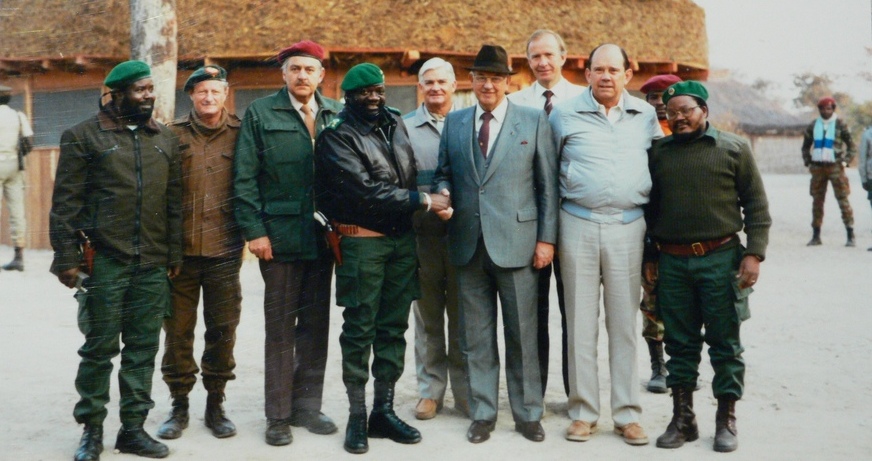
Jonas Savimbi and South African President P.W. Botha shake hands during a visit by the
president and his top ministers to UNITA headquarters in Jamba, Angola.
Perhaps the late Julius Nyerere summed up the situation best when in 1986, as President of Tanzania, he observed: "When is war not war? Apparently when it is waged by the stronger against the weaker as a pre-emptive strike. When is terrorism not terrorism? Apparently when it is committed by a more powerful government against those at home and abroad who are weaker than itself and whom it regards as a potential threat or even as insufficiently supportive of its own objectives. Those are the only conclusions one can draw in the light of the current widespread condemnation of aggression and terrorism, side by side with the ability of certain nations to attack others with impunity, and to organize murder, kidnapping and massive destruction with the support of some permanent members of the United Nations Security Council. South Africa is such a country."
The Battle of Cuito Cuanavale
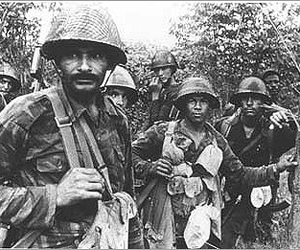 In 1987-1988, a decisive
series of battles occurred around the southeastern Angolan town of
Cuito
Cuanavale. When they occurred, these battles were the largest military
engagements in Africa since the North African battles of the Second
World
War. Arrayed on one side were the armed forces of Cuba, Angola and the
South West African People's Organization (SWAPO), on the other, the
South
African Defense Forces, military units of UNITA -- the South African
proxy organization
-- and
the South African Territorial Forces of Namibia (then still illegally
occupied
by Pretoria).
In 1987-1988, a decisive
series of battles occurred around the southeastern Angolan town of
Cuito
Cuanavale. When they occurred, these battles were the largest military
engagements in Africa since the North African battles of the Second
World
War. Arrayed on one side were the armed forces of Cuba, Angola and the
South West African People's Organization (SWAPO), on the other, the
South
African Defense Forces, military units of UNITA -- the South African
proxy organization
-- and
the South African Territorial Forces of Namibia (then still illegally
occupied
by Pretoria).
Cuito Cuanavale was a critical turning point in the struggle against apartheid. From November 1987 to March 1988, the South African armed forces repeatedly tried and failed to capture Cuito Cuanavale. In southern Africa, the battle has attained legendary status. It is considered THE debacle of apartheid: a defeat of the South African armed forces that altered the balance of power in the region and heralded the demise of racist rule in South Africa. Cuito Cuanavale decisively thwarted Pretoria's objective of establishing regional hegemony (a strategy which was vital to defending and preserving apartheid), directly led to the independence of Namibia and accelerated the dismantling of apartheid. The battle is often referred to as the African Stalingrad of apartheid. Cuba's contribution was crucial as it provided the essential reinforcements, material and planning.
In July 1987, the FAPLA, the Angolan armed forces, launched an offensive against UNITA, the apartheid state's surrogate. The Cubans objected to this military operation because it would create the opportunity for a South African invasion, which is what transpired. The South Africans invaded, stopped and threw back the Angolan forces. After terrible human and material losses, the Angolans were forced into a headlong retreat to the town and strategic military base of Cuito Cuanavale.
As the fighting became centred on Cuito Cuanavale, the Angolan Armed forces were placed in an extremely precarious situation, with its most elite formations facing annihilation. Indeed, Angola faced an existential threat. If Cuito Cuanavale fell to South Africa, then the rest of the country would be at the mercy of the invaders. Angolan General Antonio dos Santos underscored the overarching significance of the town's defence stating that if they [the South Africans] won at Cuito Cuanavale, the road would be open to the north of Angola."
Determined to transform its initial military success into a fatal blow against an independent Angola, Pretoria committed its best troops and most sophisticated military hardware to the capture of Cuito Cuanavale. As the situation of the besieged Angolan troops became critical, Havana was asked by the Angolan government to intervene. On November 15, 1987, Cuba decided to reinforce its forces by sending fresh detachments, arms and equipment, including tanks, artillery, anti-aircraft weapons and aircraft. Eventually Cuban troop strength would rise to more than 50,000. It must be emphasized that for a small country such as Cuba the deployment of 50,000 troops would be the equivalent of the U.S. deploying more than a million soldiers, or Canada more than one hundred thousand.
The Cuban commitment was immense. Fidel Castro stated that the Cuban Revolution had "put its own existence at stake, it risked a huge battle against one of the strongest powers located in the area of the Third World, against one of the richest powers, with significant industrial and technological development, armed to the teeth, at such a great distance from our small country and with our own resources, our own arms. We even ran the risk of weakening our defenses, and we did so. We used our ships and ours alone, and we used our equipment to change the relationship of forces, which made success possible in that battle. We put everything at stake in that action "
The Cuban government viewed preventing the fall of Cuito Cuanavale as imperative. A South African victory would have meant not only the capture of the town and the destruction of the best Angolan military formations, but, quite possibly, the end of Angola's existence as an independent country. The Cuban revolutionary leadership also decided to go further than the defence of Cuito Cuanavale. They decided to deploy the necessary forces and employ a plan that would both put an end once and for all to South African aggression against Angola and deliver a decisive blow against the racist state. The successful defence of Cuito Cuanavale would be the prelude to a grand and far reaching strategy that would transform the balance of power in the region.
 South Africa's efforts to seize Cuito Cuanavale
were
stymied by the
Cubans and Angolans. With the South Africans preoccupied at Cuito
Cuanavale, the Cubans achieved a strategic coup by carrying out an
outflanking manoeuvre. To the west of Cuito Cuanavale and along the
Angolan/Namibian border, Havana deployed 40,000 Cuban troops, supported
by 30,000 Angolan and 3,000 SWAPO troops. Pretoria had become so
focused
on seizing Cuito Cuanavale that they had left themselves exposed to a
major
military counterstroke.
South Africa's efforts to seize Cuito Cuanavale
were
stymied by the
Cubans and Angolans. With the South Africans preoccupied at Cuito
Cuanavale, the Cubans achieved a strategic coup by carrying out an
outflanking manoeuvre. To the west of Cuito Cuanavale and along the
Angolan/Namibian border, Havana deployed 40,000 Cuban troops, supported
by 30,000 Angolan and 3,000 SWAPO troops. Pretoria had become so
focused
on seizing Cuito Cuanavale that they had left themselves exposed to a
major
military counterstroke.
The Cubans, together with Angolan and SWAPO forces advanced toward Namibia. This advance exposed the insecurity and vulnerability of the South African troops in northern Namibia. Such was this vulnerability that a senior South African officer said, "Had the Cubans attacked [Namibia] they would have over-run the place. We could not have stopped them." This was further compounded by South African debacles at the end of June 1988 at Calueque and Tchipia, where the South Africans suffered serious defeats, which were described by a South African newspaper as "a crushing humiliation." Cuba also achieved air supremacy. Facing the new powerful force assembled in southern Angola and having lost control of the skies, the South Africans withdrew from Angola.
This defeat on the ground forced South Africa to the negotiating table, resulting in Namibian independence and dramatically hastening the end of apartheid. The regional balance of power had been fundamentally transformed. The respected scholar Victoria Brittan observed that Cuito Cuanavale became "a symbol across the continent that apartheid and its army were no longer invincible." In a July 1991 speech delivered in Havana, Nelson Mandela underscored Cuito Cuanavale's and Cuba's vital role:
"The Cuban people hold a special place in the hearts of
the people of
Africa. The Cuban internationalists have made a contribution to African
independence, freedom and justice unparalleled for its principled and
selfless
character. We in Africa are used to being victims of countries wanting
to carve
up our territory or subvert our sovereignty. It is unparalleled in
African history
to have another people rise to the defense of one of us. The defeat of
the
apartheid army was an inspiration to the struggling people in South
Africa!
Without the defeat of Cuito Cuanavale our organizations would not have
been
unbanned! The defeat of the racist army at Cuito Cuanavale has made it
possible for me to be here today! Cuito Cuanavale was a milestone in
the
history of the struggle for southern African liberation!"

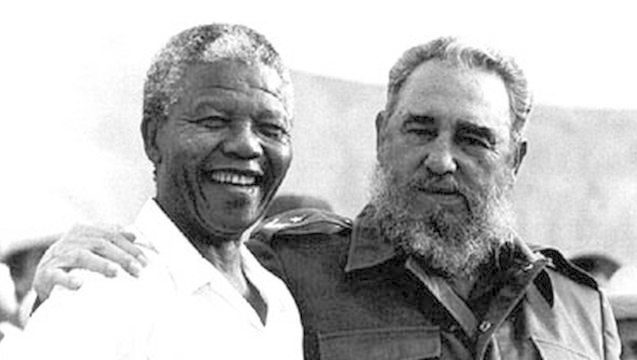
Left: Fighters of Umkhonto we Sizwe (Spear of the Nation), the armed wing of the African National Congress; right: Nelson Mandela and Fidel Castro, during the former's visit to Cuba in 1991.
In 1994, Mandela further declared: "If today all South Africans enjoy the rights of democracy; if they are able at last to address the grinding poverty of a system that denied them even the most basic amenities of life, it is also because of Cuba's selfless support for the struggle to free all of South Africa's people and the countries of our region from the inhumane and destructive system of apartheid. For that, we thank the Cuban people from the bottom of our heart."
The 1987-88 military reversal in Angola constituted a mortal blow to the apartheid regime. The battle of Cuito Cuanavale ended its dream (a nightmare for the region's peoples) of establishing hegemony over all of southern Africa as a means by which to extend the life of the racist regime.
Paying Humanity's Debt
As a direct witness and participant in Africa's anti-colonial & national liberation struggles, the late Jorge Risquet always elaborated on the profound ties that bound Cuba and Africa together. This unbreakable historic connection formed the poignant base for the Cuban Revolution's solidarity with Africa. In a 2012 speech honouring the great Pan-Africanist, Kwame Nkrumah, Risquet pointed out:
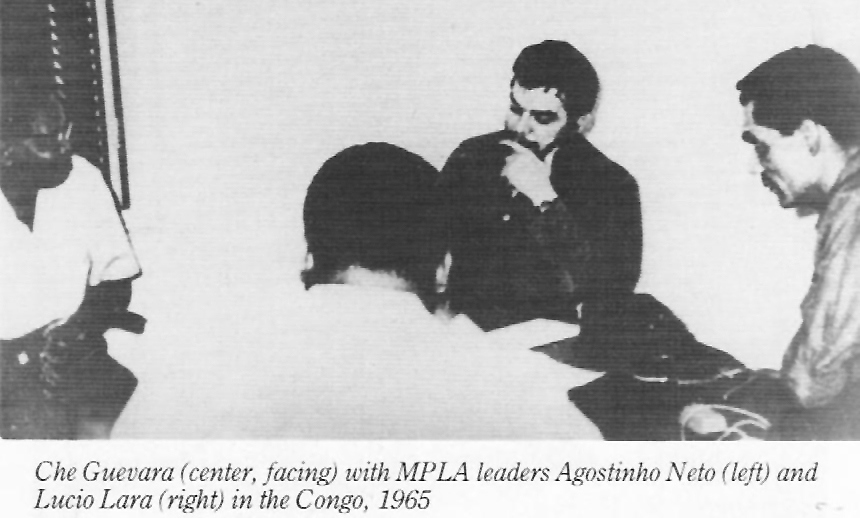 "This was the understanding
with which Cuban fighters
came to ancestral
Africa to fight side by side with the people against colonialism and
the
oppressive apartheid regime. For 26 years, 381,000 Cuban soldiers and
officers
fought alongside African populations -- between April 24, 1965, when
Ernesto
Che Guevara and his men crossed Lake Tanganyika, and May 25, 1991, when
the remaining 500 Cuban fighters returned home triumphant Twenty-four
hundred Cuban internationalist fighters lost their lives on African
soil. Today
we no longer send soldiers. Now, we send doctors, teachers, builders,
specialists in various fields."
"This was the understanding
with which Cuban fighters
came to ancestral
Africa to fight side by side with the people against colonialism and
the
oppressive apartheid regime. For 26 years, 381,000 Cuban soldiers and
officers
fought alongside African populations -- between April 24, 1965, when
Ernesto
Che Guevara and his men crossed Lake Tanganyika, and May 25, 1991, when
the remaining 500 Cuban fighters returned home triumphant Twenty-four
hundred Cuban internationalist fighters lost their lives on African
soil. Today
we no longer send soldiers. Now, we send doctors, teachers, builders,
specialists in various fields."
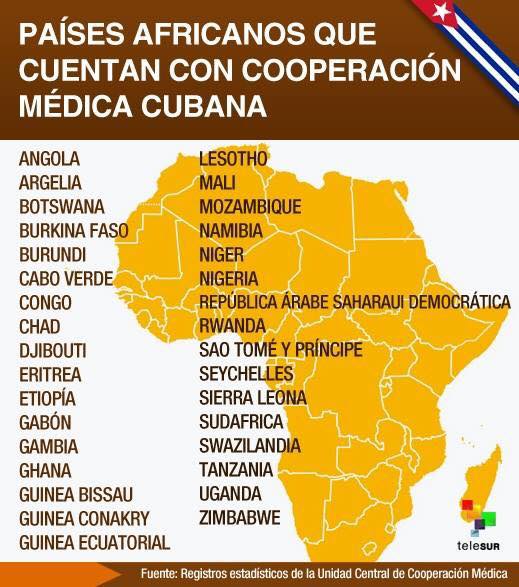 The 32 African countries with which Cuba carries out medical cooperation. |
While circumstances may have changed, Cuba's solidarity with Africa continues. Cuba made a critical contribution to the fight against the Ebola epidemic in the West African nations of Guinea, Liberia and Sierra Leone. The Cuban medical mission was by far the largest sent by any country. Standing side-by-side with the peoples of West Africa, Cuban doctors and nurses went to West Africa and joined the struggle against Ebola. As Jorge Lefebre Nicolas, Cuba's ambassador to Liberia, declared: "We cannot see our brothers from Africa in difficult times and remain there with our arms folded." At the September 16, 2014 meeting of the United Nations Security Council, Cuban representative Abelardo Moreno declared: "Humanity has a debt to African people. We cannot let them down." Even the Wall Street Journal declared, "Few have heeded the call, but one country has responded in strength: Cuba."
Cuba is often described as the only foreign country to
have gone to Africa
and gone away with nothing but the coffins of its sons and daughters
who died
in the struggles to liberate Africa. Cuba's role in Angola illustrates
the division
between those who fight for the cause of freedom, liberation and
justice, to
repel invaders and colonialists, and those who fight against just
causes, those
who wage war to occupy, colonize and oppress. The island's
internationalist
missions in Africa are a profound challenge to those who argue that
relations
among the world's nations and peoples are -- and can only be --
determined
by self-interest and the pursuit of power and wealth. Cuba provides the
example that it is possible to build relations based on genuine
solidarity and
social love: demonstrating the alternatives which permit people to
realize their
deepest aspirations, and that another better world is possible.
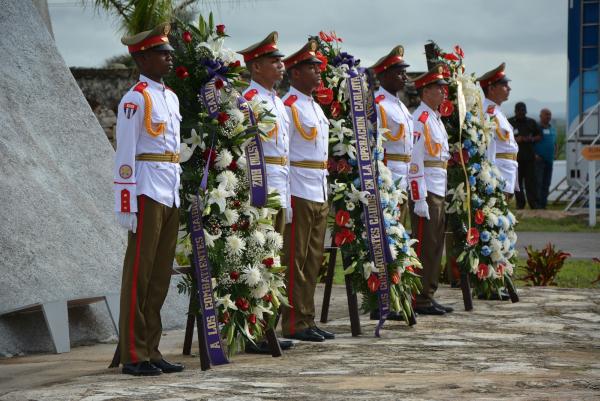
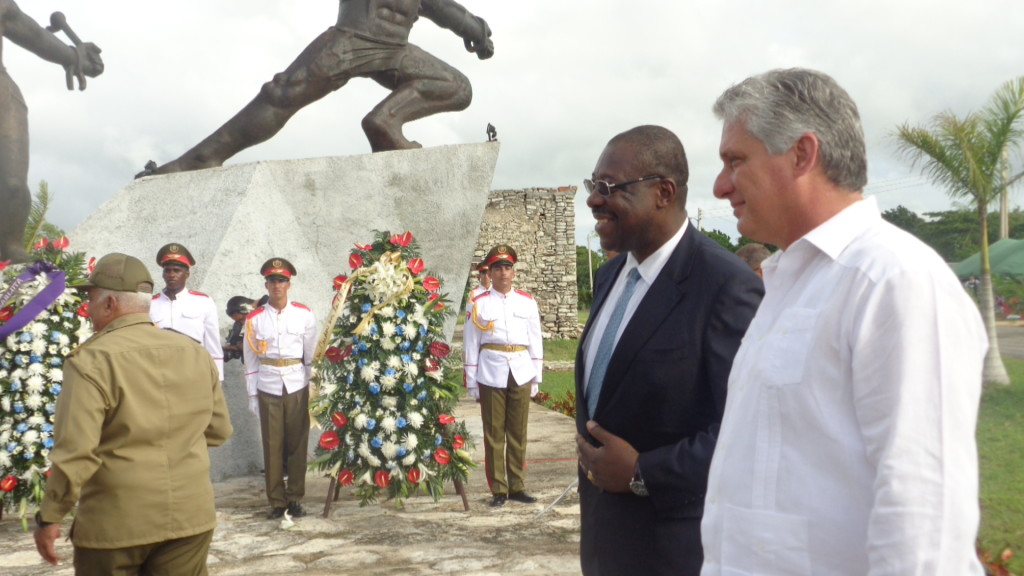
The 40th anniversary of Operación Carlota is marked at the Monument to the Rebel Slave, at the former Triunvirato sugar plantation in Matanzas, November 5, 2015. Participants include Candido Pereira dos Santos Van-Dunem, Minister of Defence of Angola (second from right) and Miguel Diaz-Canel (far right), First Vice President of the Councils of State and Ministers.
Isaac Saney teaches history at Dalhousie University and Saint Mary's University, Halifax. He is co-chair and national spokesperson of the Canadian Network On Cuba. He is the author of the acclaimed book "Cuba: A Revolution in Motion" and is currently putting the final touches on the book "Africa's Children Return! Cuba, the War in Angola and the End of Apartheid."
Toronto Event November 13-14:
Africa's Children Return! Cuba and African Liberation
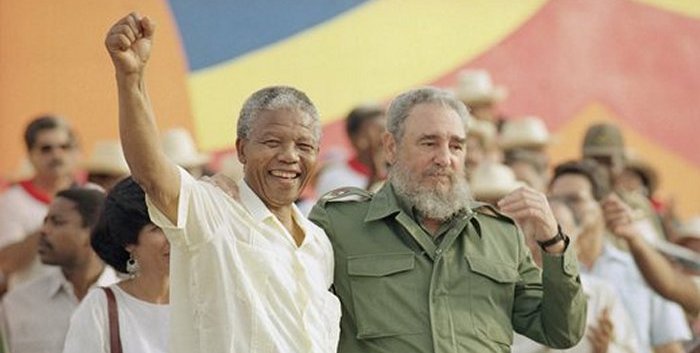
United Steelworkers Hall
25 Cecil St., Toronto
On November 13 and 14, 2015 we will commemorate the 40th anniversary of Cuba's crucial role in the southern African national and anti-colonial liberation struggles, as well as discuss and examine Cuba's ongoing solidarity with Africa and Africans, and other peoples of the world.
Come and hear acclaimed AfroCuban scholar Nicolás Hernández Guillén discuss Cuba-Africa connections. As we journey through the United Nations International Decade for People of African Descent, the subject Africa's Children Return! Cuba and African Liberation assumes great poignancy and relevance.
Friday, November 13 -- 7 pm
Commemoration of Cuba's role in African liberation struggles, with a tribute to the late Jorge Risquet, an historic member of Cuba's revolutionary leadership and participant in the African anti-colonial/national liberation struggles.
Nicolás Hernández Guillén will discuss the history of the African-Cuban relationship, the impact of Africa on Cuba and why hundreds of thousands of Cubans were willing to demonstrate such profound solidarity with Africa, especially Angola. He is the president of the Nicolás Guillén Foundation, dedicated to preserving and promoting the work of the National Poet of Cuba, Nicolás Cristóbal Guillén Batista. As an Afro-Cuban Guillen provided very important analysis and commentary on Cuba's relations with Africa. Nicolás Hernández (the grandson of Nicolás Guillén) is an internationally respected and acclaimed scholar.
Saturday, November 14 -- 9:30 am-4:30 pm
Cuba's role in African liberation, its solidarity with Africa & current African liberation struggles
Film: Cuba and African National Liberation Struggles
Guilty of Defending Africa! Soweto to Cuito Cuanavale: Cuba and the War to Liberate Southern Africa
Cuba and Ebola: (Yet) Another Example of Cuban Medical Internationalism
Film: Barefoot: The Burkina Fasso October Revolution
Speakers include:
John Kirk, leading specialist on Cuba and author the acclaimed book, Healthcare Without Borders: Understanding Cuban Medical Internationalism. ("Kirk's invaluable study reveals to us, for the first time, the range and character of Cuba's remarkable achievements, which should be an inspiration and a model for those with far greater advantages." Noam Chomsky;)
Isaac Saney, a Cuba specialist who teaches at Dalhousie University (Canada). Author of the acclaimed, Cuba: A Revolution In Motion, he is currently finishing the book Africa's Children Return! Cuba, The War in Angola and the End of Apartheid.
Amet Lo, Justice Committee for Thomas Sankara and Group for research and Initiative For The Liberation of Africa.
For more information: isaney@hotmail.com or call Isaac Saney: 902-494-8810 or adifferentbooklist@rogers.com or call Miguel San Vincente: 416-538-0889
Sponsors include:
Canadian Network On Cuba; A Different
Booklist;
Dalhousie James R. Johnston Chair in Black Canadian Studies;
Asociación de
Cubanos Residentes en Toronto "Juan Gualberto Gómez"; and
Canadian-Cuban
Friendship Association Toronto.

In Memoriam
Deepest Respects for
Cuban Revolutionary Combatant Jorge Risquet
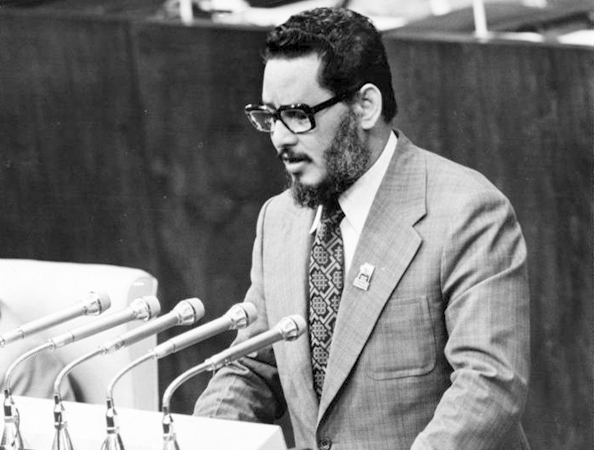
Jorge Risquet addresses the First Congress of the Communist Party of Cuba, 1975.
The Communist Party of Canada (Marxist-Leninist) expresses its sincere condolences to the Communist Party of Cuba and the Cuban people on the passing away on September 28 of Jorge Risquet, a worthy member of Cuba's historic revolutionary leadership. From his youth, Risquet participated in the Cuban revolutionary movement, and was in the forefront of many historic developments that gave rise to the success of the Cuban revolution on January 1, 1959. Subsequently, in the African anti-colonial national liberation struggles he played a central role in the events and negotiations that led to the independence of Namibia and accelerated the end of the racist regime in South Africa.
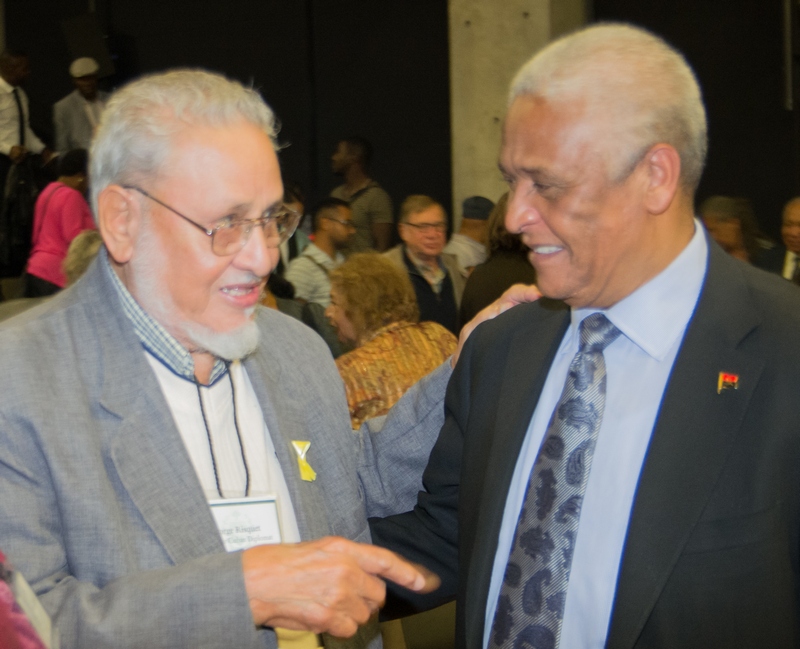 Jorge Risquet greets then-Angolan Ambassador to Canada Agostinho Tavares during a visit to Toronto, September 27, 2013. |
Risquet visited Toronto in September 2013, attending the international symposium, Africa's Unknown War: Apartheid Terror, Cuba and Southern African Liberation organized by the Canadian Network on Cuba. He held the audience's complete attention as he recounted the events which led to the declaration of Namibian independence in 1990. His example as a committed revolutionary and internationalist inspires those who had the honour of knowing him.
Risquet died in Havana at age 85 as a result of a long, serious disease. Born in Havana on May 6, 1930, he joined the revolutionary youth movement in 1943. He was Cuba's Representative and Head for Latin America in the World Federation of Democratic Youth and carried out an internationalist mission in Guatemala in 1954.
During the Fulgencio Batista dictatorship he was kidnapped, tortured and incarcerated. He joined the Rebel Army in 1958 in the 2nd Frank País East Front.
After the triumph of the Revolution, Risquet held the positions of Head of the Political Department and Head of Operations of the Army in the former Oriente province; Organization Secretary of the Provincial Committee of the United Party of the Socialist Revolution of Cuba (which became the Communist Party) in that province; head of the "Patricio Lumumba" Internationalist Battalion in Congo Brazzaville; Minister of Labour; and Head of the Cuban Civil Internationalist Mission in the People's Republic of Angola between 1975 and 1979.
He headed the Cuban delegation to the four-party negotiations (Cuba-Angola-U.S.A.-South Africa) in 1988.
Risquet was a member of the Central Committee of the Communist Party of Cuba since its creation; member of the Party's Secretariat from 1973 to 1990; member of the Politburo from 1980 to 1991, and Deputy to the National Assembly of People's Power from its founding to 1993.
A graduate in journalism, founder of several publications and the author of numerous articles, he acted as advisor in the process of creation and edition of important works, particularly related to the liberation struggle of African peoples.
His ashes were placed at the Mausoleum of Veterans in the city's Colon Cemetery on September 29. They will be moved to the Mausoleum of the 2nd Frank Pais East Front at a later date.
(ACN, Havana, September 29, 2015. Photos: Granma, TML)
Bidding a Brother Goodbye
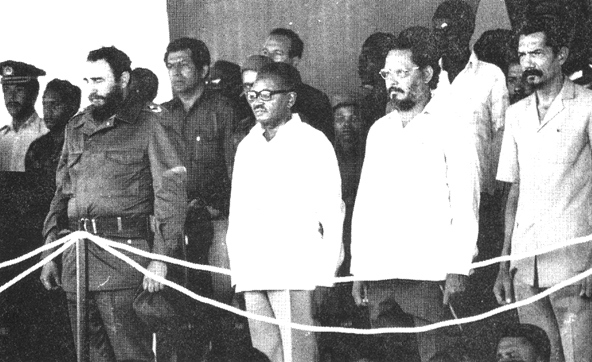
Visit of Commander in Chief Fidel Castro to Angola, 1976. To the right of the Cuban leader are President Agostinho Neto, Jorge Risquet and MPLA General Secretary Lucio Lara. (Cubadebate)
Jorge Risquet was like the brother I never had. We had been working together since 1994. He had been selected by Fidel and Raúl Castro to oversee my access to the closed Cuban archives, and he headed the declassification commission that was created for my research on Cuban policy in Africa.
Ours began as a good professional relationship. I appreciated Risquet's intelligence, his profound knowledge of Africa, his sense of humor. It was pleasant to work with him, and it was useful: Risquet was an incisive critic and on many occasions he helped me understand that my analysis of certain aspects of Cuba's policy in Africa was mistaken.
With the passing of time, my respect and admiration for Risquet turned into a friendship that became ever deeper. For more than two decades, for me he became a brother, the only brother I ever had. The void his death has left in my life is immense.
Others will describe Risquet's distinguished participation in the Youth of the Cuban Communist Party, how heroically he resisted the torture when he was captured by Batista's police in late 1956, his actions in the Sierra Maestra at Raúl Castro's side, and many other episodes of a beautiful life. Here I want to remember that part of Risquet's life I know very well: the role he played in Africa as the representative of Fidel Castro and the Cuban Revolution.
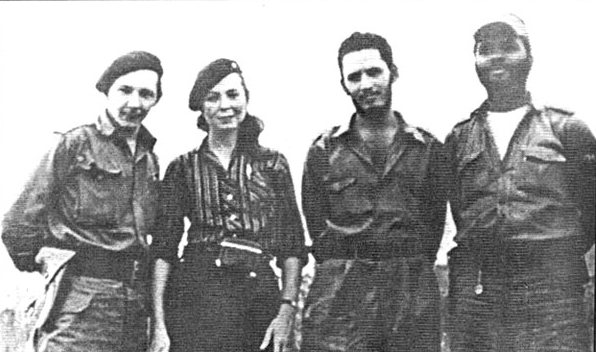
From left Raul Castro, Vilma Espin, Jose Jorge Risquet and Nivaldo Causse.
(Asela de los Santos/Juventud Rebelde)
Risquet's African journey began in July 1965, when Fidel chose him to lead the Cuban column he would send to Congo Brazzaville. I don't want this remembrance to be too long. I will simply say that Risquet and his column carried out perfectly the task that Fidel had assigned them: they saved the country's progressive government from a military coup -- and they did so without shedding a single drop of blood -- they carried out the first polio vaccination campaign in the history of Congo Brazzaville, and they gave military training to the guerrillas of Agostinho Neto's MPLA. This was Cuba's first link with the MPLA.
But Risquet's name will be forever associated with Angola, even though there are some Angolans who now want to silence the glorious role Cuba played there from 1975, when the first Cuban soldiers arrived to repel the South African invasion (encouraged by Washington), until 1991, when the last Cuban soldiers returned home. Throughout, Risquet was Fidel Castro's point man for Angola. As such, he had to confront not only the Americans but also the Soviets.
As I write these words, two moments come immediately to mind. The first, Risquet's encounter with General of the Army Valentin Varennikov, the third highest ranking officer of the Red Army, in December 1983. They met in Luanda at the headquarters of the Cuban military mission. "After the customary exchange of courtesies, we turned to the business at hand," Varennikov wrote in his memoirs. "Risquet started to speak first, and I did not object, but when it was my turn, I remarked, as if in jest: 'And to think that I had naively believed that I would speak first because I am the guest.' Risquet countered: 'We do not consider a Soviet general to be a guest among us.'"[1]
The discussion that followed sheds light on Cuban-Soviet relations in Angola, on how the Cubans dealt with their Big Brother, and on Risquet's ability to be simultaneously tough and diplomatic.
Risquet began by recalling that in November 1982 Andropov had told Castro "that our relations must always be frank, honest and loyal. He said something that Comrade Fidel liked very much ...: 'We must not fail to tell a truth or express an opinion just to avoid an unpleasant moment.' ... With you, now," he told Varennikov, "I will follow this principle." And, on behalf of Raúl Castro, he began administering a tongue lashing to Varennikov for the flawed military strategy that the Soviet Military Mission was advocating in Angola. He spoke with subtle irony, with intelligence and bluntly.
"I told you, a few days ago, about the friendship and fraternity we feel for the Soviet Union," Risquet reminded Varennikov, "how we see in the Soviet military our teachers, our brothers, and how much your military expertise has meant for Cuba. But I also told you that we have had disagreements [in Angola]. ... We want to make it very clear, comrade General of the Army, that the Cuban military command will not be dragged into any adventure. ... We are responsible for the lives of our soldiers and cannot allow them to be sacrificed without reason." Risquet concluded: "You can be absolutely certain, dear comrade General of the Army, that if the South Africans attack the line that we are defending, we will fight fiercely without any hesitation, but know with equal certainty that we will refuse to endanger even a single Cuban life in an operation we consider ill-advised, wrong-headed and unrealistic. ... Believe me, comrade General of the Army, it is very unpleasant to have to speak in this way. We understand how uncomfortable this must be for you, who bear no responsibility for what has happened. ... We see the Soviets as our brothers, but we consider it necessary to tell you all this so that you will return to the Soviet Union with a complete and full understanding of the views of our Minister of Defense."[2]
Risquet always stressed in our conversations that all he was doing was to carry out the instructions of Fidel and Raúl; but he failed to add that he did so with uncommon intelligence, brilliance, and eloquence.
This eloquence, intelligence and brilliance were much in
evidence when
Risquet led the Cuban delegation during the 1988 quadripartite
negotiations
(among South Africa, the United States, Cuba and Angola) to attain
peace in
southwestern Africa. The decisive round occurred in Cairo, in late June
1988.
By then the Cuban troops had defeated the South African onslaught
against
Cuito Cuanavale in the southeast of Angola, Cuban columns were
advancing
in the southwest toward the Namibian border, and Cuban MIGs were flying
over the skies of northern Namibia.
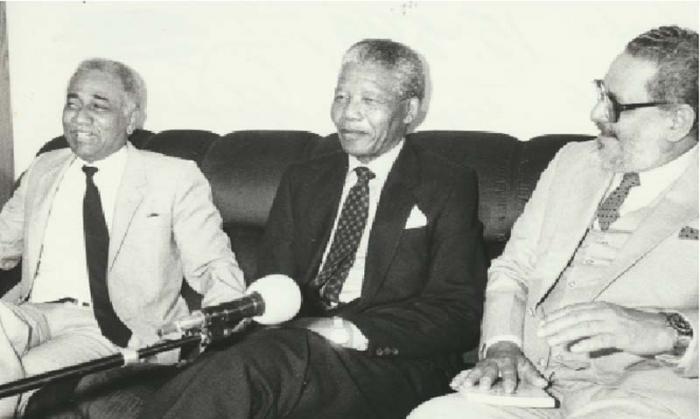
The Cairo round was the last time that the South Africans proposed their ludicrous demands: the simultaneous withdrawal of their troops and the Cuban troops from Angola, a government of national unity of MPLA and Savimbi in Luanda, and the postponement of any discussion over the independence of Namibia. These demands were absurd because, as Raúl Castro said a few days before the Cairo round, Cuba had "flipped the tortilla"[3]: the Cuban troops had achieved superiority over the army of apartheid in Angola, and the Americans and South Africans knew it.
It was Risquet, eloquent, passionate, a master in the art of sarcasm, who dominated the Cairo round. "A document devoid of both seriousness and realism such as that presented by the South African government is a tasteless joke," he said, referring to the demands presented by the South African delegation. "The era of your military adventures, of your despoliations carried out with impunity, of your massacres of refugees -- as in Cassinga in 1978 -- and of similar crimes against the people of Angola, this era has ended. ... The South Africans must understand that they will not win at this table what they have failed to win on the battlefield. ...They cannot act like victors when they are in fact an army of aggressors that is battered and in retreat. The South Africans want to know the exact number of Cuban troops in Angola and where they are stationed. This is not information one gives to the enemy. Let them try to get it on the battlefield."[4]
After the last plenary session, the head of the U.S. delegation, assistant secretary of state for Africa Chester Crocker, sought out Risquet. Crocker seemed to believe that arrogance was a useful virtue for a U.S. diplomat. He was accustomed to dealing with Angolan officials, whom he lectured and upbraided. But now he was facing a Cuban, a representative of Fidel Castro, whose soldiers were marching toward the Namibian border. For Washington and Pretoria the pressing question was," Would the Cubans halt at the border?" This is why Crocker sought out Risquet.
"My question is the following," Crocker told Risquet: "Does Cuba intend to halt the advance of its troops at the border between Namibia and Angola?' Risquet replied, "I can't answer you. I can't give you or the South Africans a Meprobamato [a well-known Cuban tranquillizer] ... I am not saying whether or not our troops will stop. .... Listen to me, I am not threatening. If I told you that they will not stop, it would be a threat. If I told you that they will stop, I would be giving you a Meprobamato, a Tylenol. I want neither to threaten you nor to reassure you ... What I have said is that the only way to guarantee [that our troops stop at the border] is to reach an agreement [on the independence of Namibia]."[5]
Some in Cuba criticized Risquet for speaking so harshly to Crocker. Of course, there are times when one must speak softly -- but at other times it is necessary to be harsh. Risquet understood, when talking with Crocker, that this was such a moment because only the fear of the victorious Cuban troops advancing into Namibia would force the United States and South Africa to accept the just demands of Cuba and Angola. He was right. Looking back at the Cairo round, and his encounter with Risquet, Crocker lamented: "Reading the Cubans is yet another art form. They are prepared for both war and peace ... We witness considerable tactical finesse and genuinely creative moves at the table. This occurs against the backdrop of Castro's grandiose bluster and his army's unprecedented projection of power on the ground."[6]
It is true, Risquet was carrying out the instructions of Fidel and Raúl -- but he did it so well!
And now this man so noble, so
generous, so devoted to
the revolution and
its leaders, has died. Cuba has lost a great man, and I have lost my
brother.
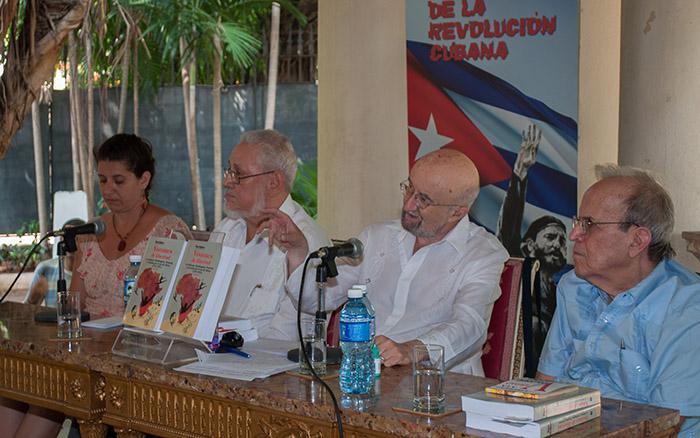
Notes
1. Valentin Varennikov, Nepovtorimoe, Moscow: Sovestskii pisatel, 2001, 4: 272-73.
2. Memcon (Risquet, Varennikov), 25 Dec. 1983, Centro de Información de las Fuerzas Armadas Revolucionarias, Havana.
3. "Reunión con el Comandante en Jefe el 18/6/88," ibid. (Title added by TML Weekly)
4. "Conversaciones RPA-Cuba EEUU-RSA," 24 June 1988, afternoon sess., Archive of the Central Committee of the Cuban Communist Party, Havana.CC.
5. Memcon (Risquet, Crocker), 26 June 1988, ibid.
6. Crocker to Acting Secretary, 25 Aug. 1988, p. 6, National Security Archive, Washington, DC.
Read The Marxist-Leninist
Website: www.cpcml.ca
Email: editor@cpcml.ca
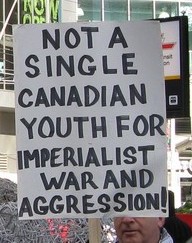
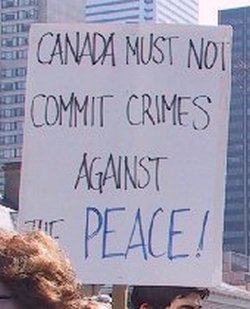
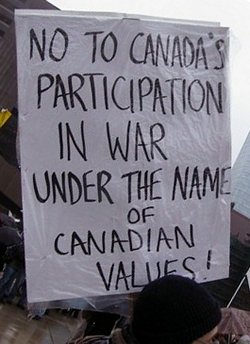
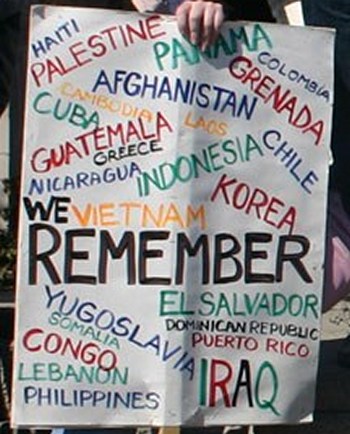 On this Remembrance Day,
with the war government of Stephen Harper
defeated, the new Liberal government promises to "renew Canada's
commitment to peacekeeping operations." So long as this "renewal" does
not include taking Canada out of NATO nor dismantling NATO
it is ominous, not reassuring. Far from ensuring peace, it means
stepping up
the very methods which have proven themselves to be morally criminal in
Bosnia and Kosovo, Afghanistan, Iraq, Libya and now Syria, among other
places. The people of Haiti among others have a lot
to say
about the kind of humanitarian aid Canada offers, dubbed "death squad
democracy."
On this Remembrance Day,
with the war government of Stephen Harper
defeated, the new Liberal government promises to "renew Canada's
commitment to peacekeeping operations." So long as this "renewal" does
not include taking Canada out of NATO nor dismantling NATO
it is ominous, not reassuring. Far from ensuring peace, it means
stepping up
the very methods which have proven themselves to be morally criminal in
Bosnia and Kosovo, Afghanistan, Iraq, Libya and now Syria, among other
places. The people of Haiti among others have a lot
to say
about the kind of humanitarian aid Canada offers, dubbed "death squad
democracy."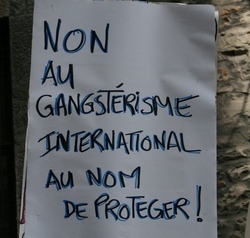 Within Canada the Liberals
say they will provide $25
million in annual
funding for a restored Youth Service Program (Katimavik). The Prime
Minister is also promoting what is called Voluntourism with the
for-profit
"social enterprise" Me to We, appearing at its November 10 We Day event
in
Ottawa before a crowd of 16,000 youth. Me to We and We Day are funded
by various monopolies including RBC, Telus, Bell Media, PotashCorp,
Ford,
Staples, Holt Renfrew and Norstroms. To help block the striving of
Canadian
youth for a bright future, Me to We sells the idea of "changing the
world" by
paying for trips to developing countries and doing volunteer work
alongside
other activities. It is promoted in schools, in the media and directly
by the
monopolies which fund it as well as selling Me to We products the
proceeds of which are said to go to charitable causes.
Within Canada the Liberals
say they will provide $25
million in annual
funding for a restored Youth Service Program (Katimavik). The Prime
Minister is also promoting what is called Voluntourism with the
for-profit
"social enterprise" Me to We, appearing at its November 10 We Day event
in
Ottawa before a crowd of 16,000 youth. Me to We and We Day are funded
by various monopolies including RBC, Telus, Bell Media, PotashCorp,
Ford,
Staples, Holt Renfrew and Norstroms. To help block the striving of
Canadian
youth for a bright future, Me to We sells the idea of "changing the
world" by
paying for trips to developing countries and doing volunteer work
alongside
other activities. It is promoted in schools, in the media and directly
by the
monopolies which fund it as well as selling Me to We products the
proceeds of which are said to go to charitable causes.
